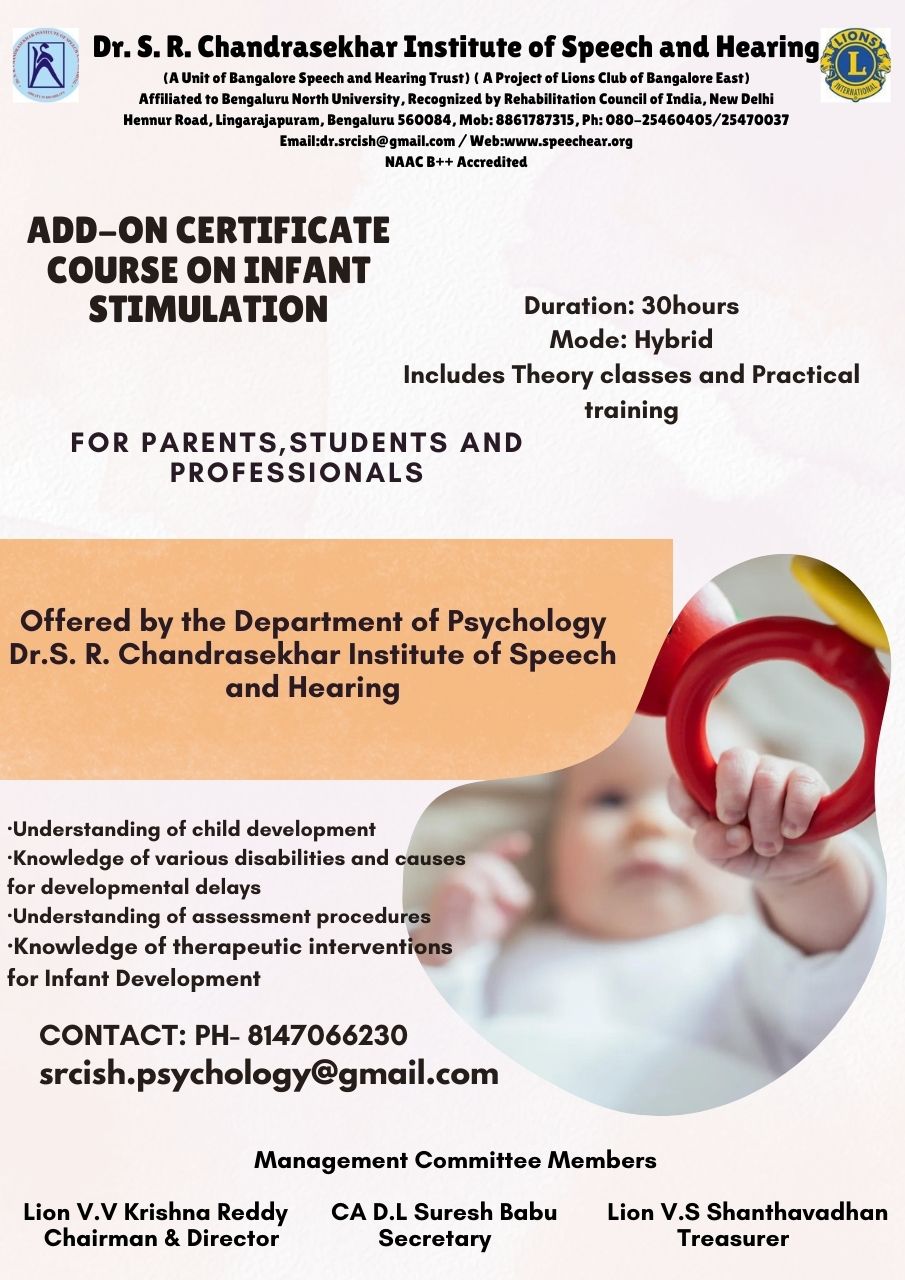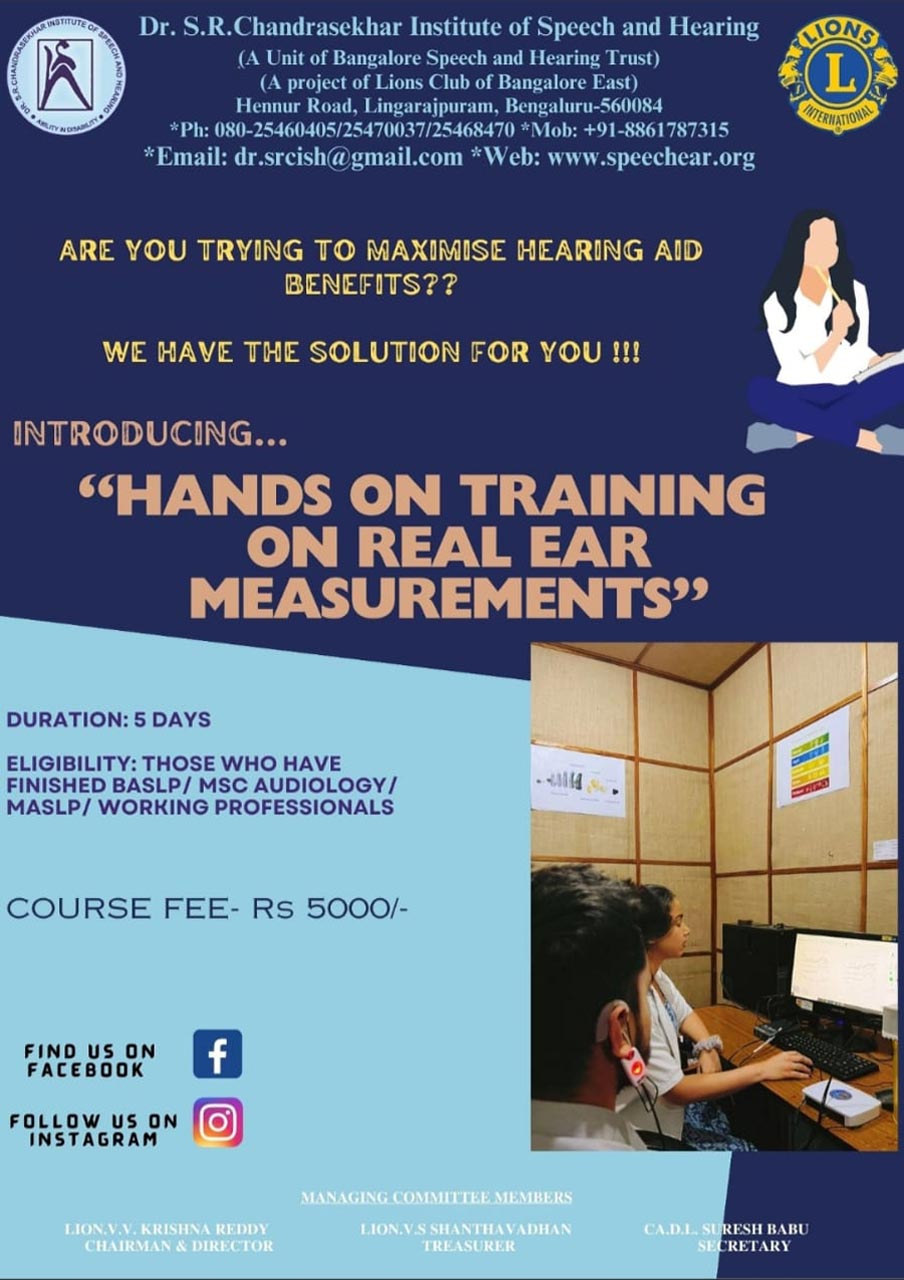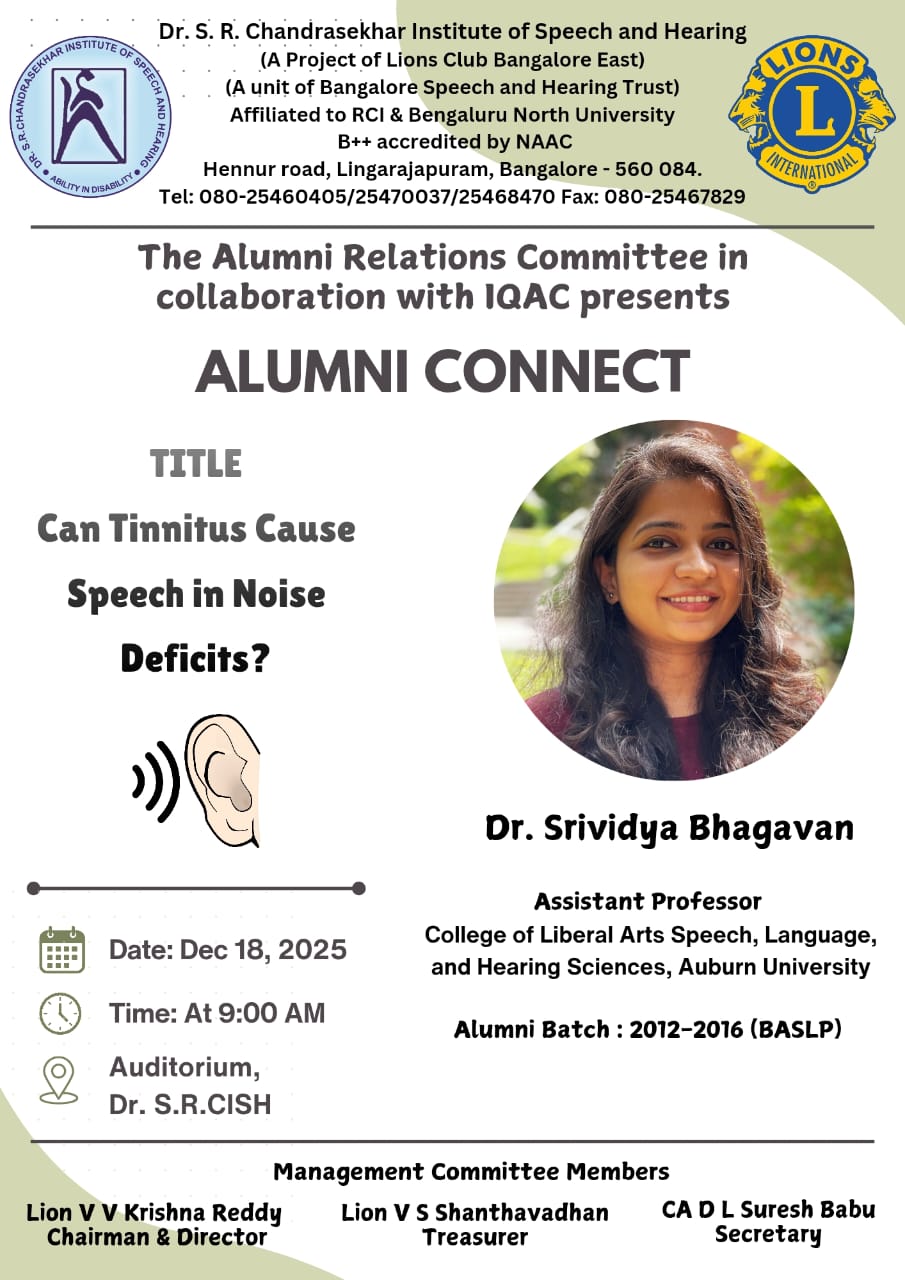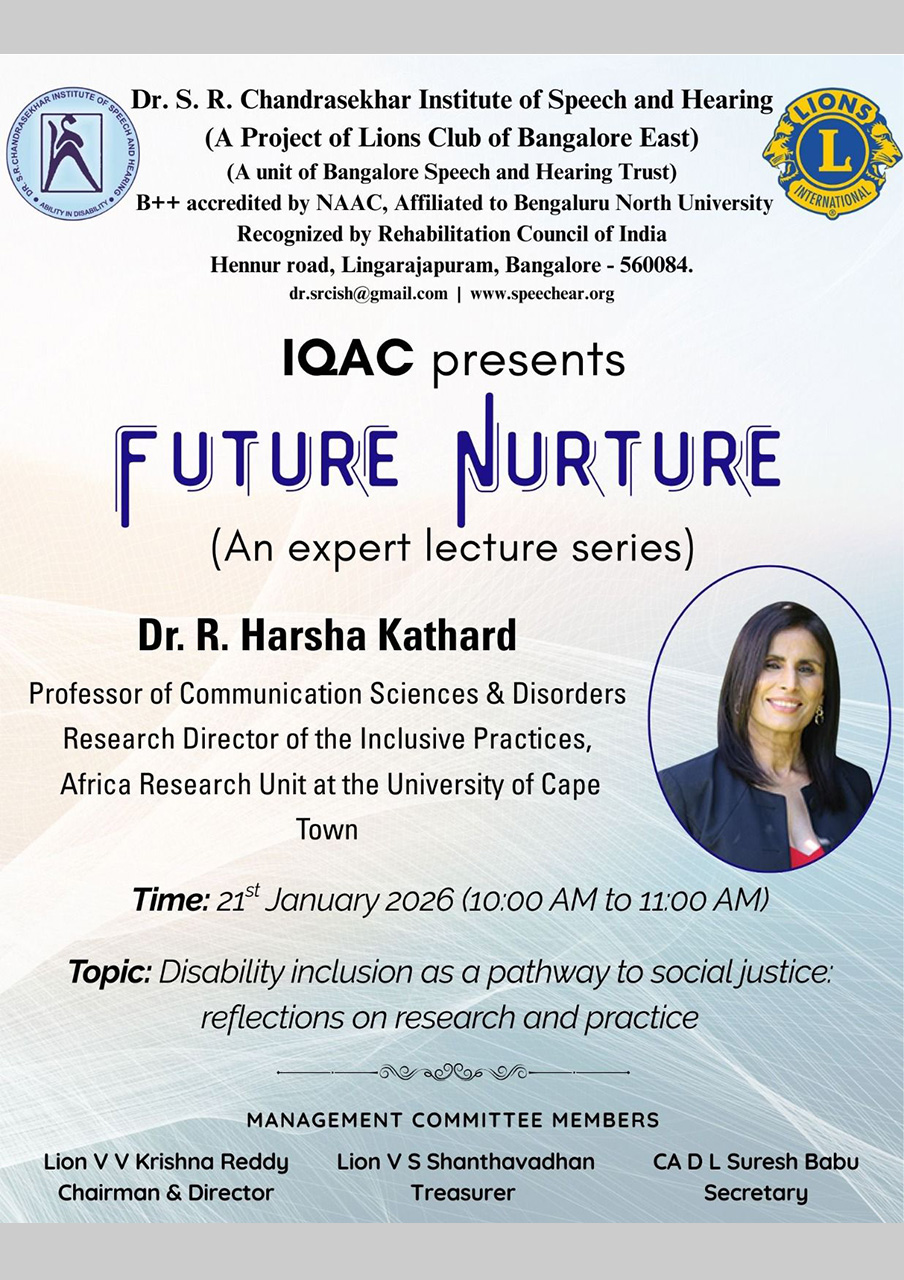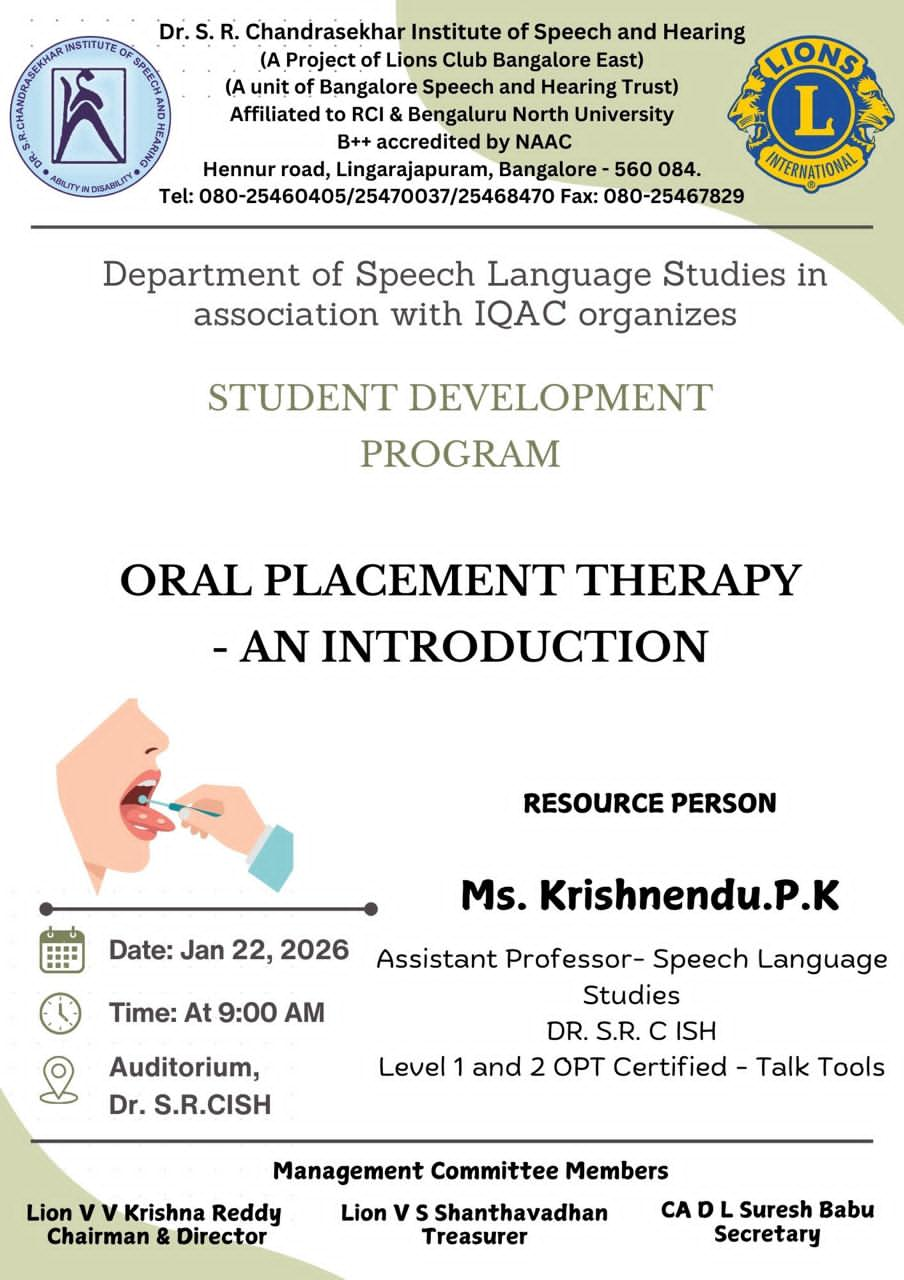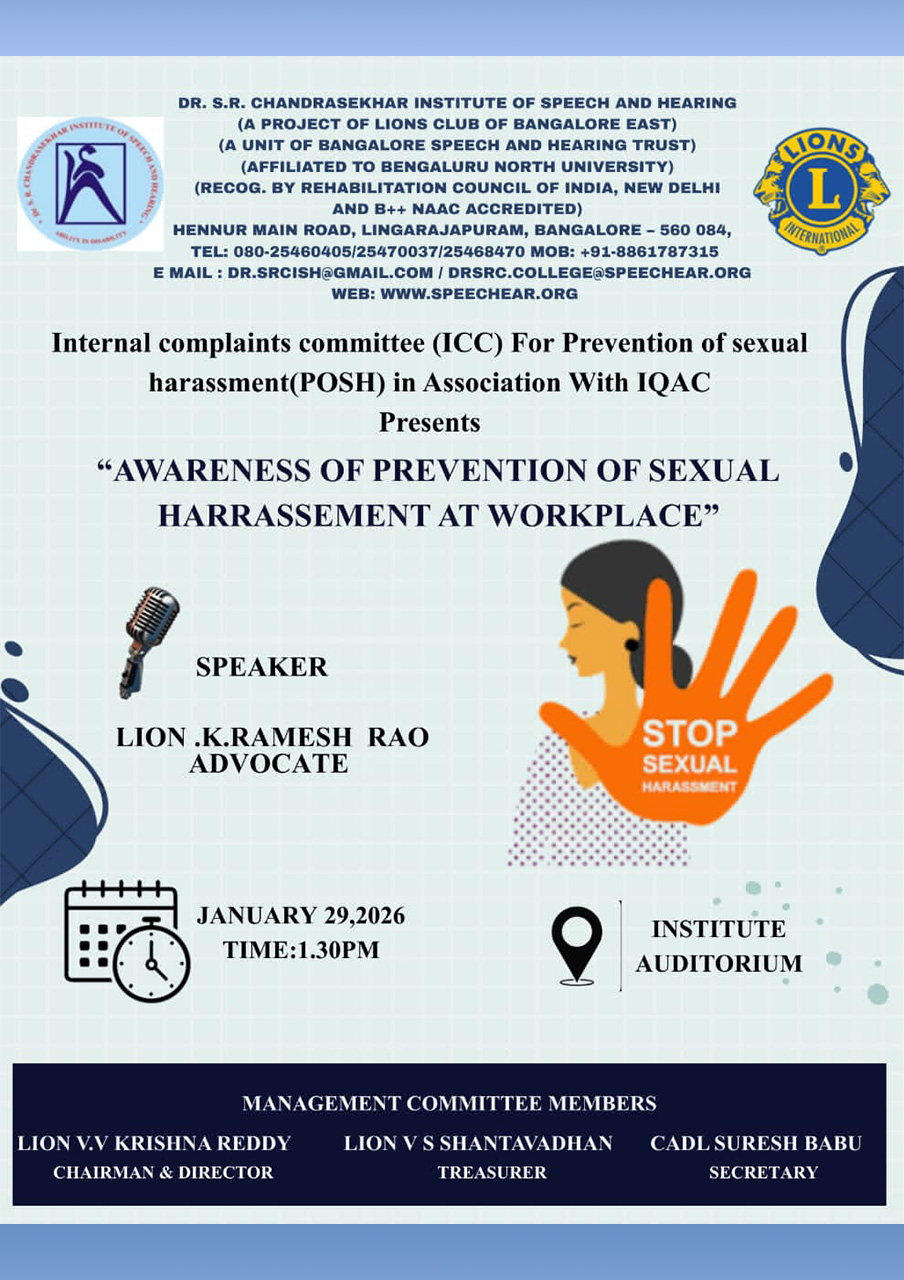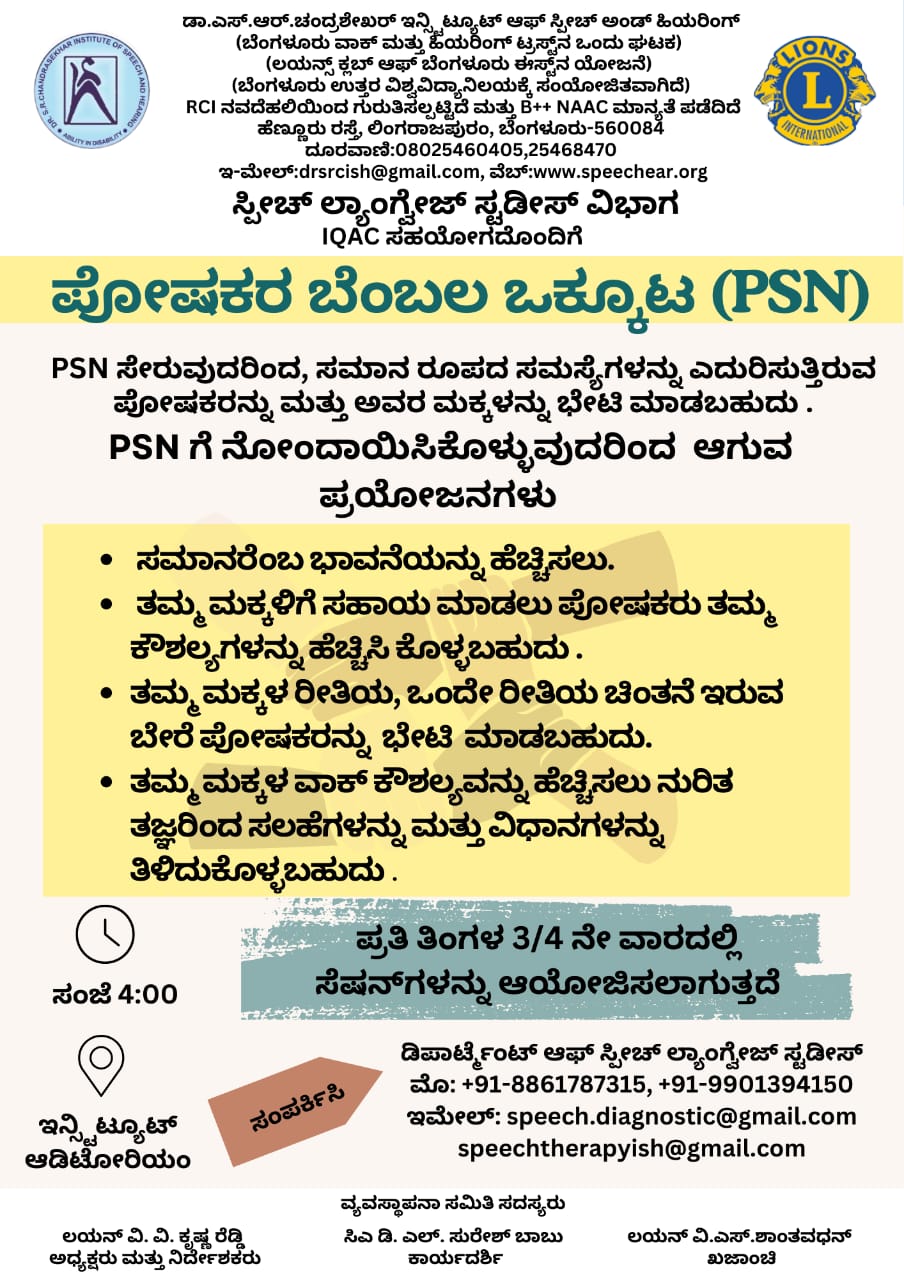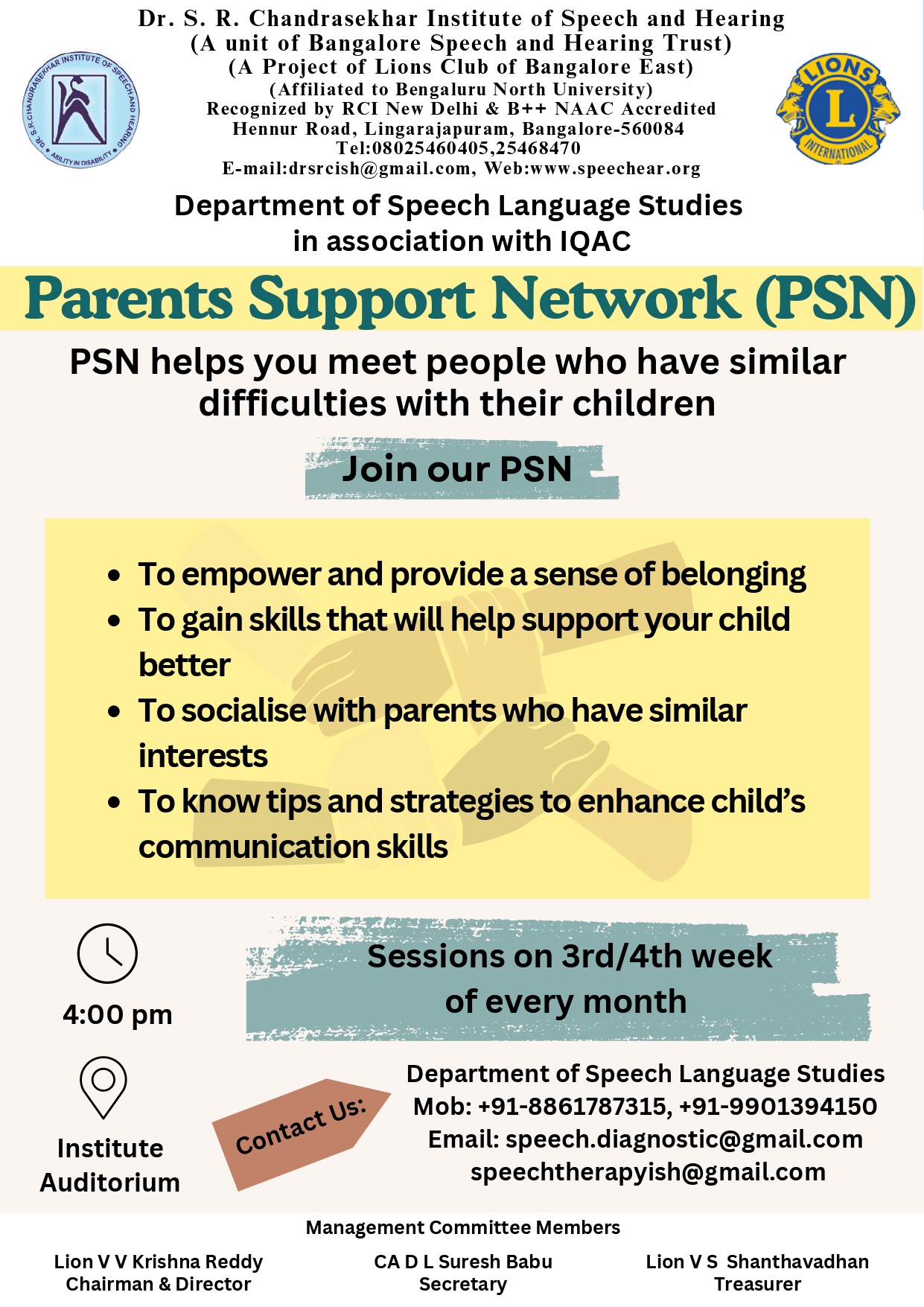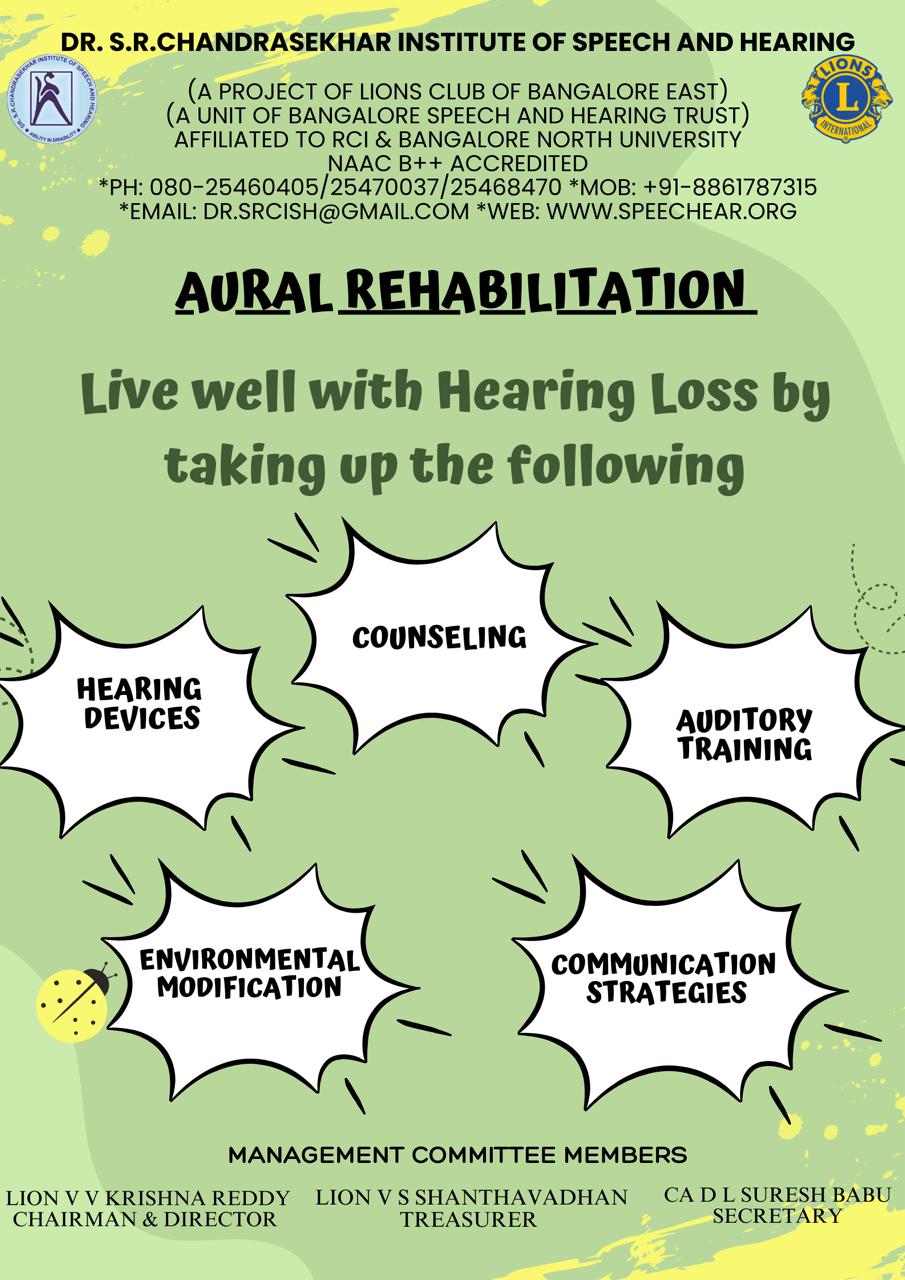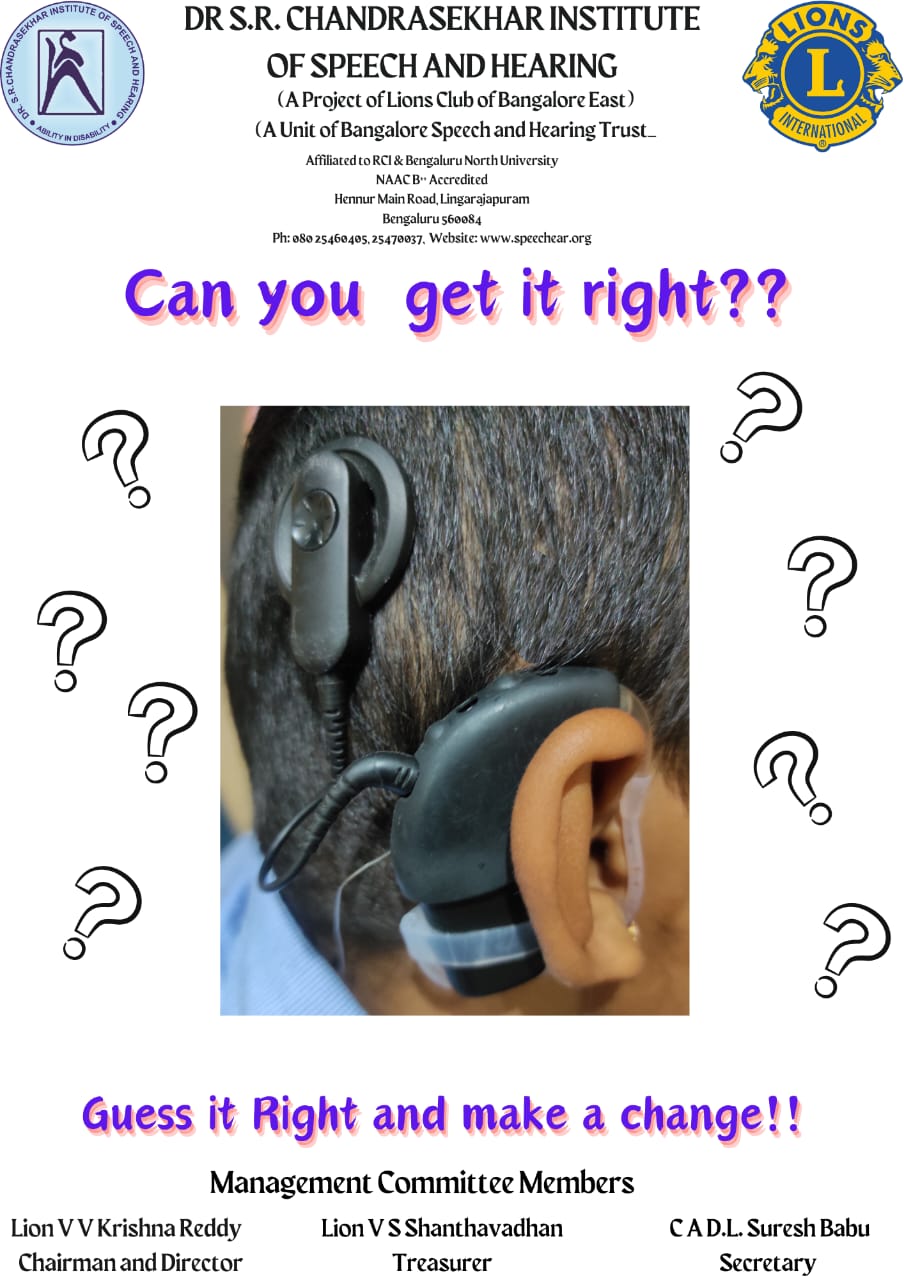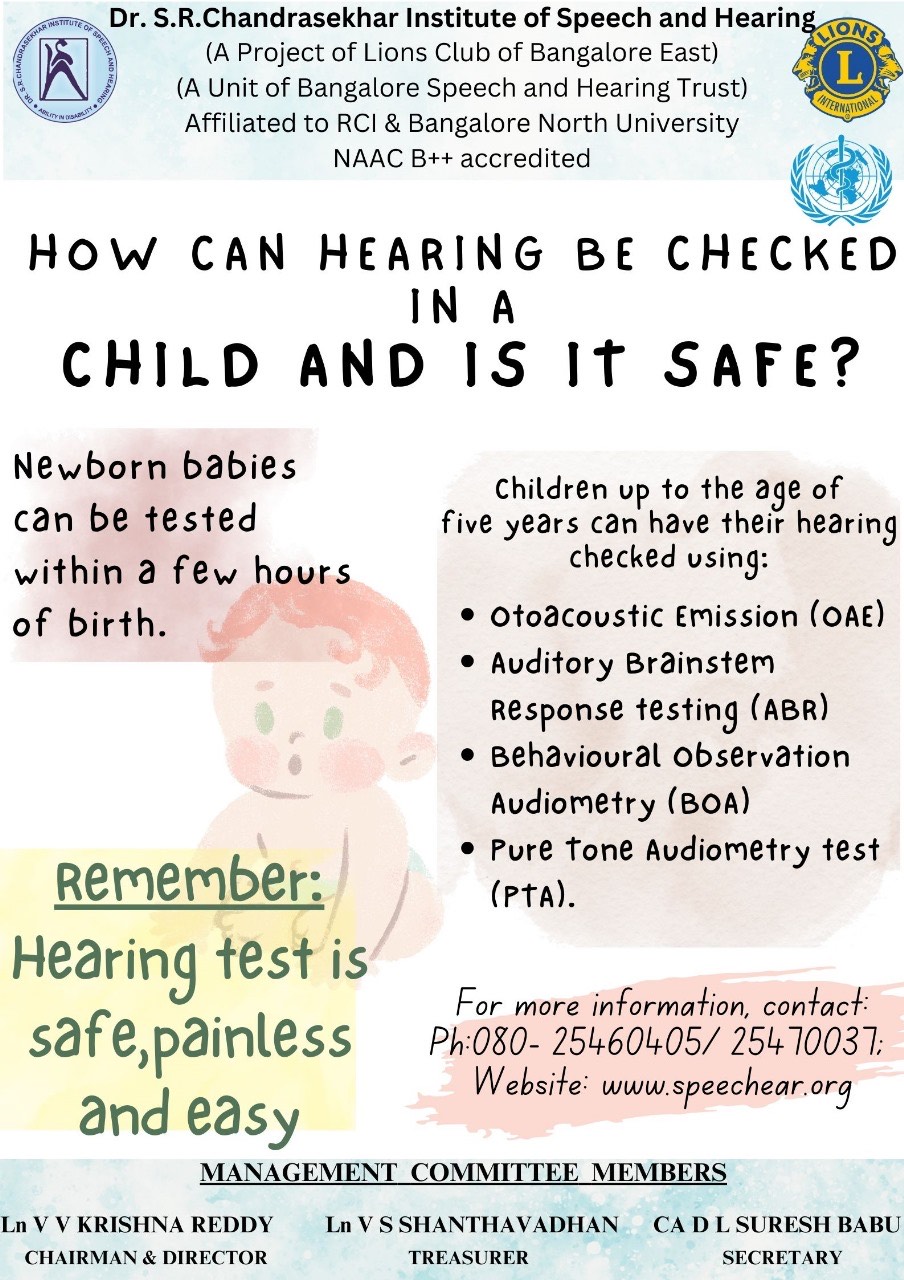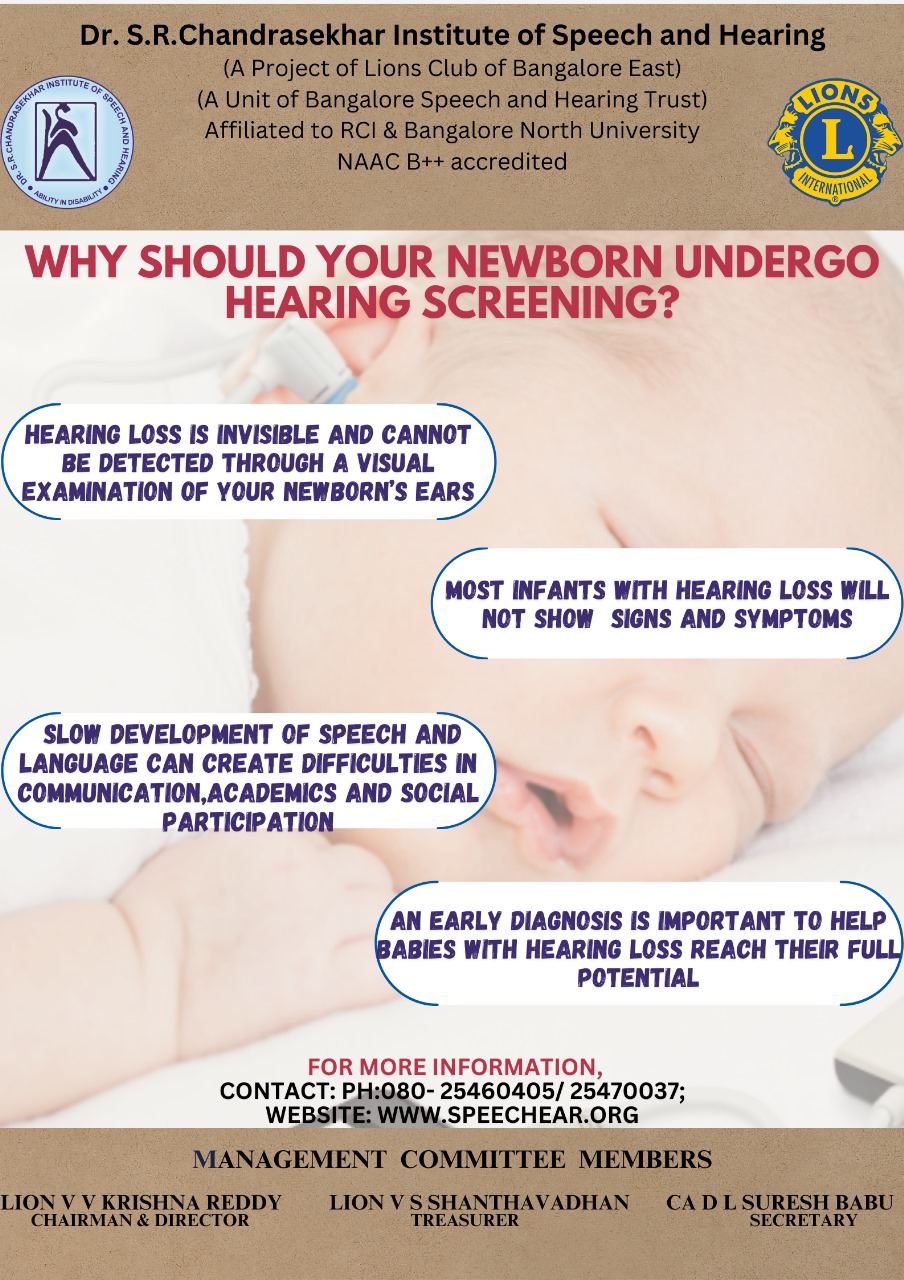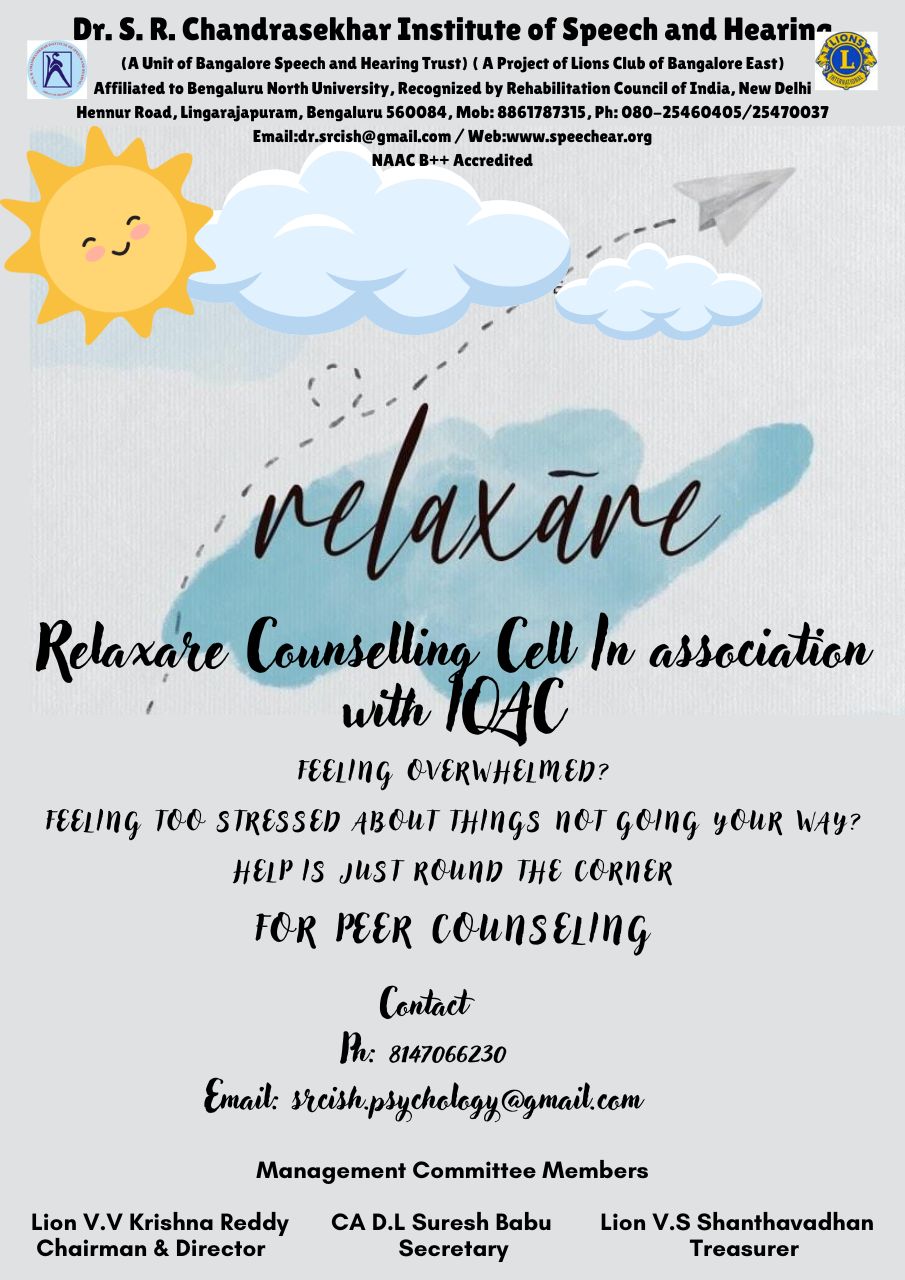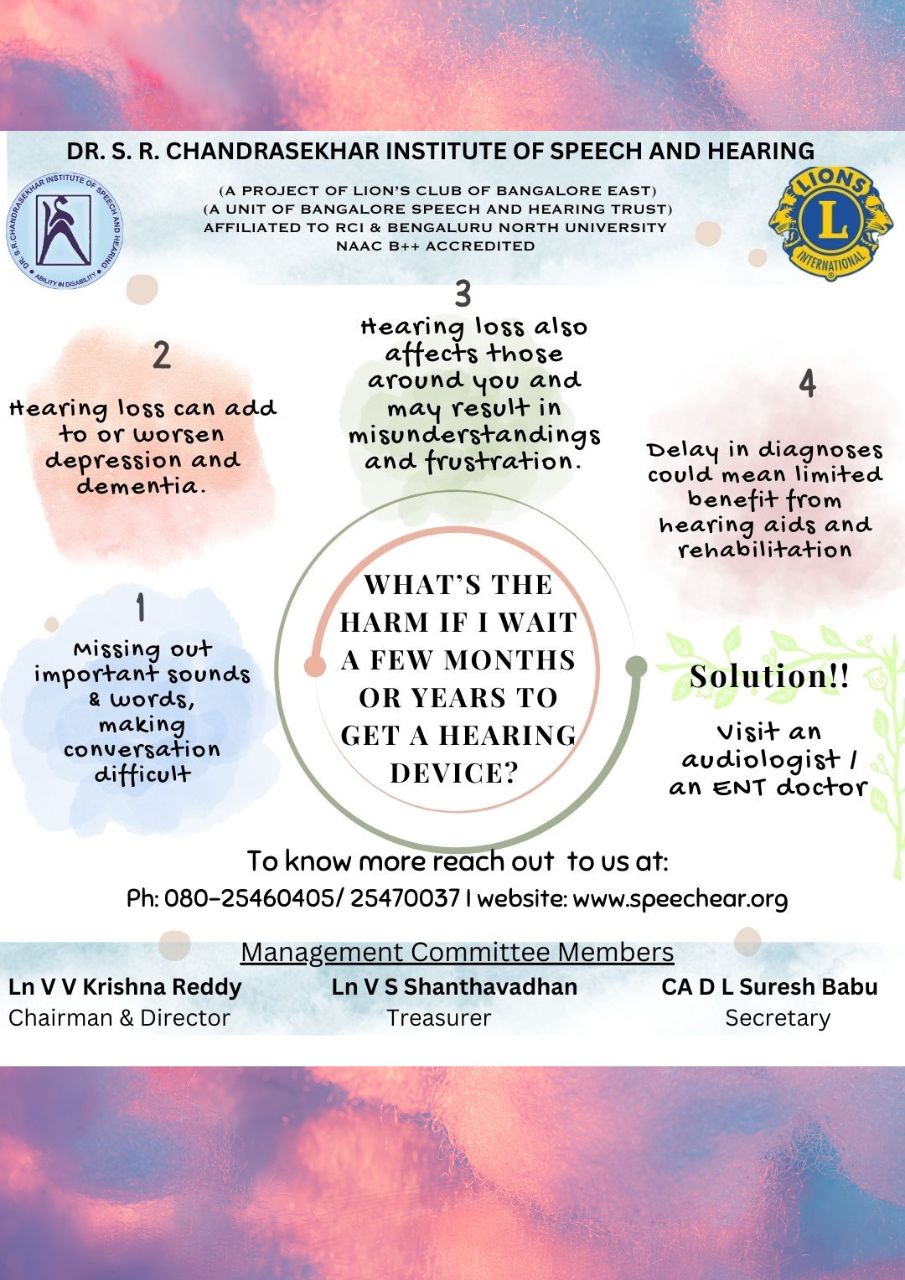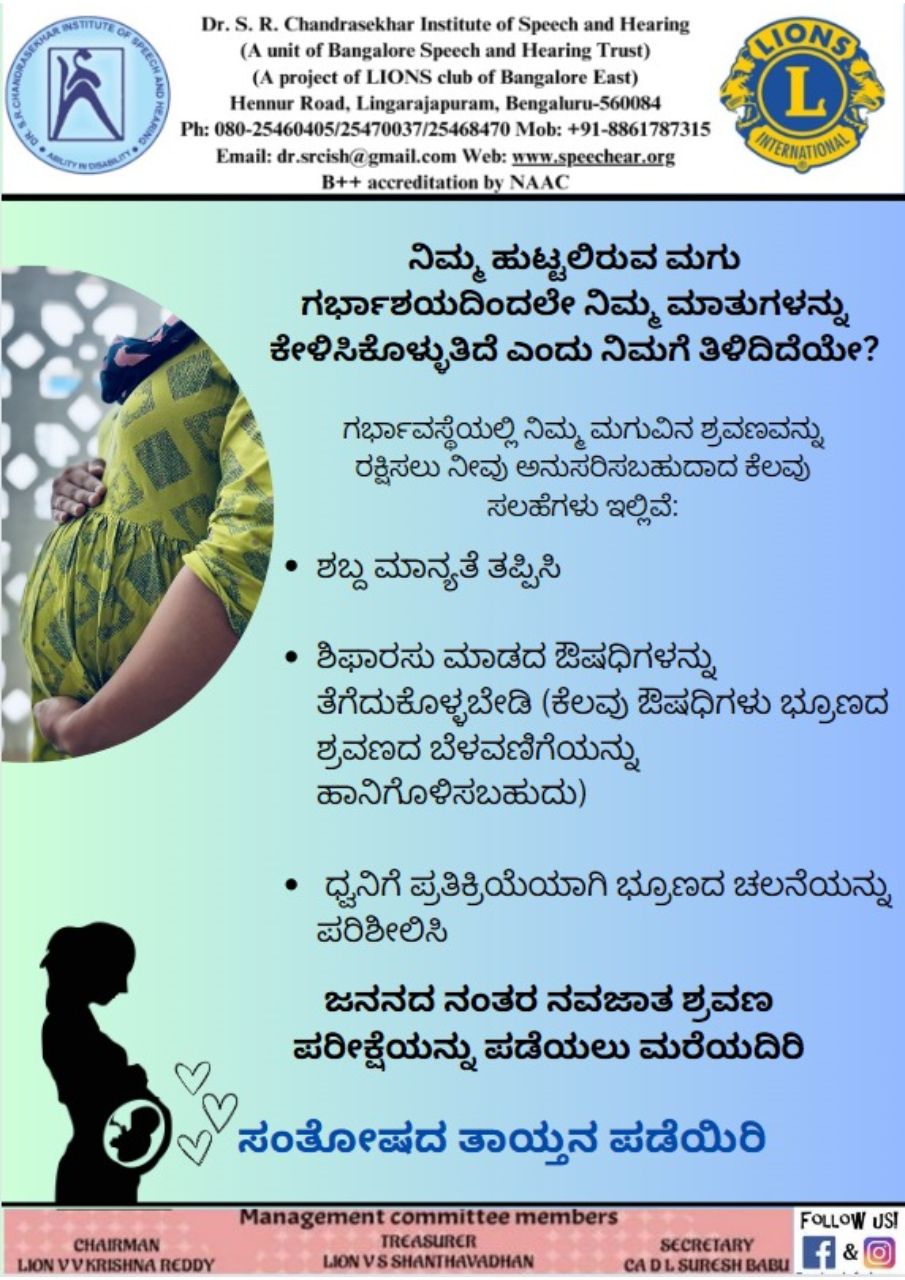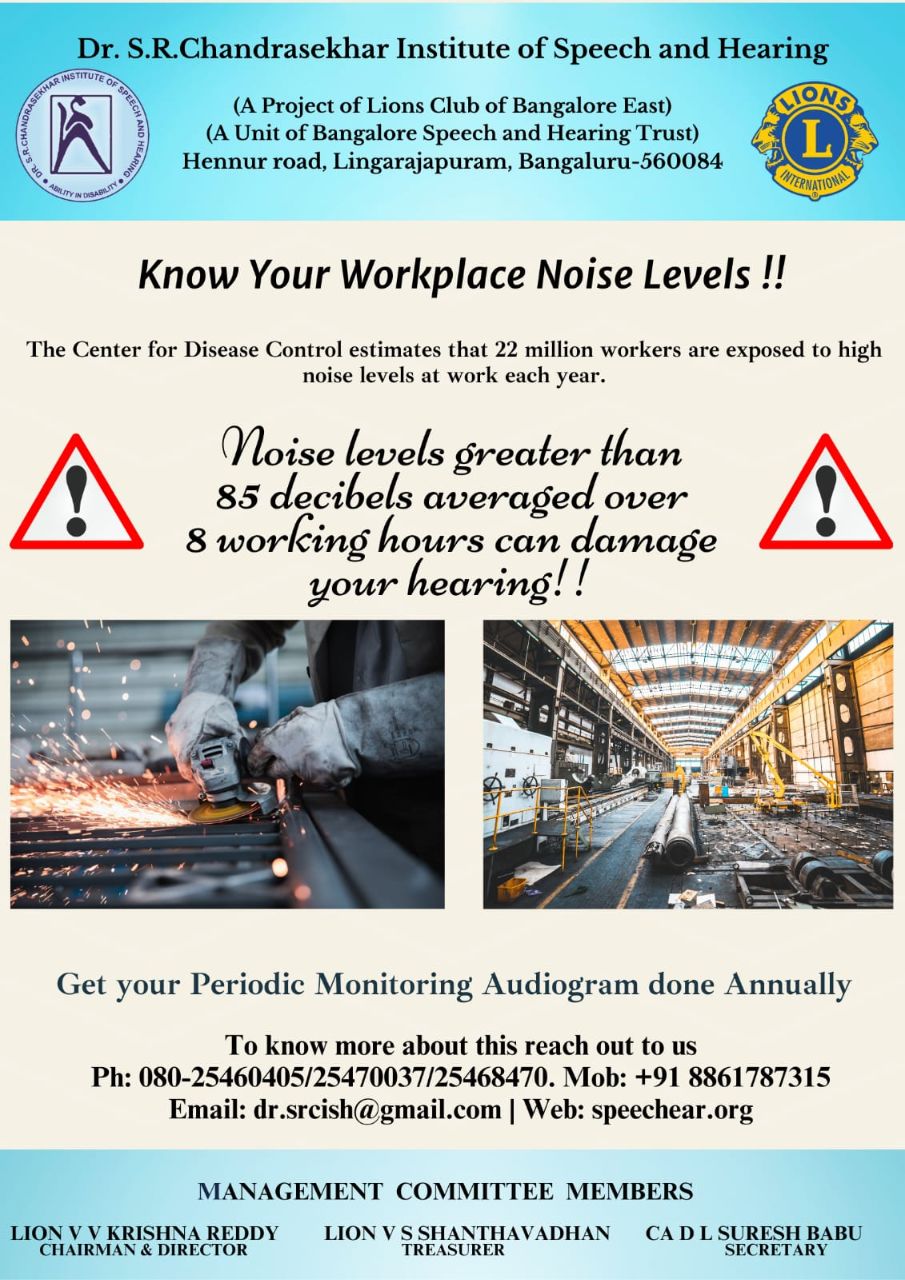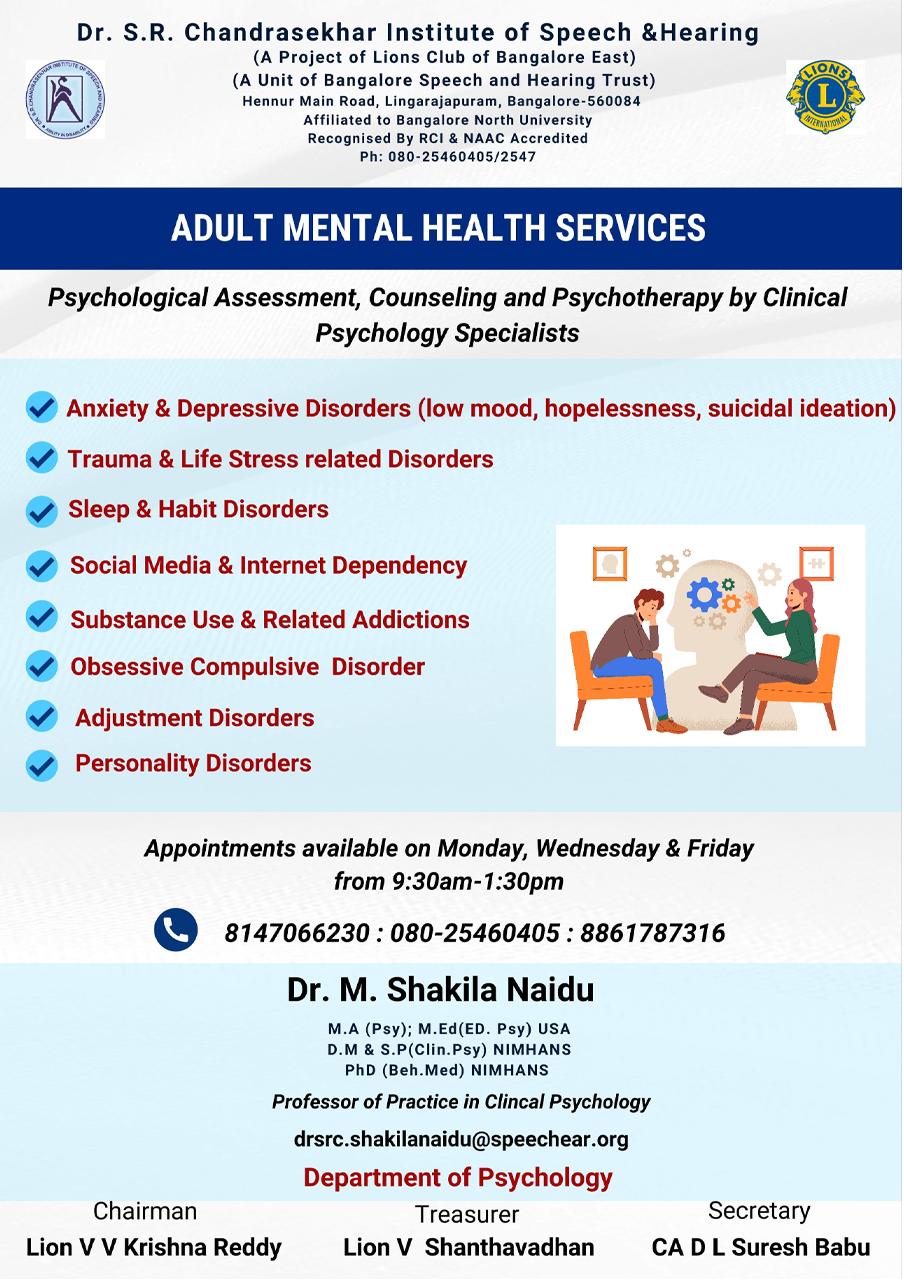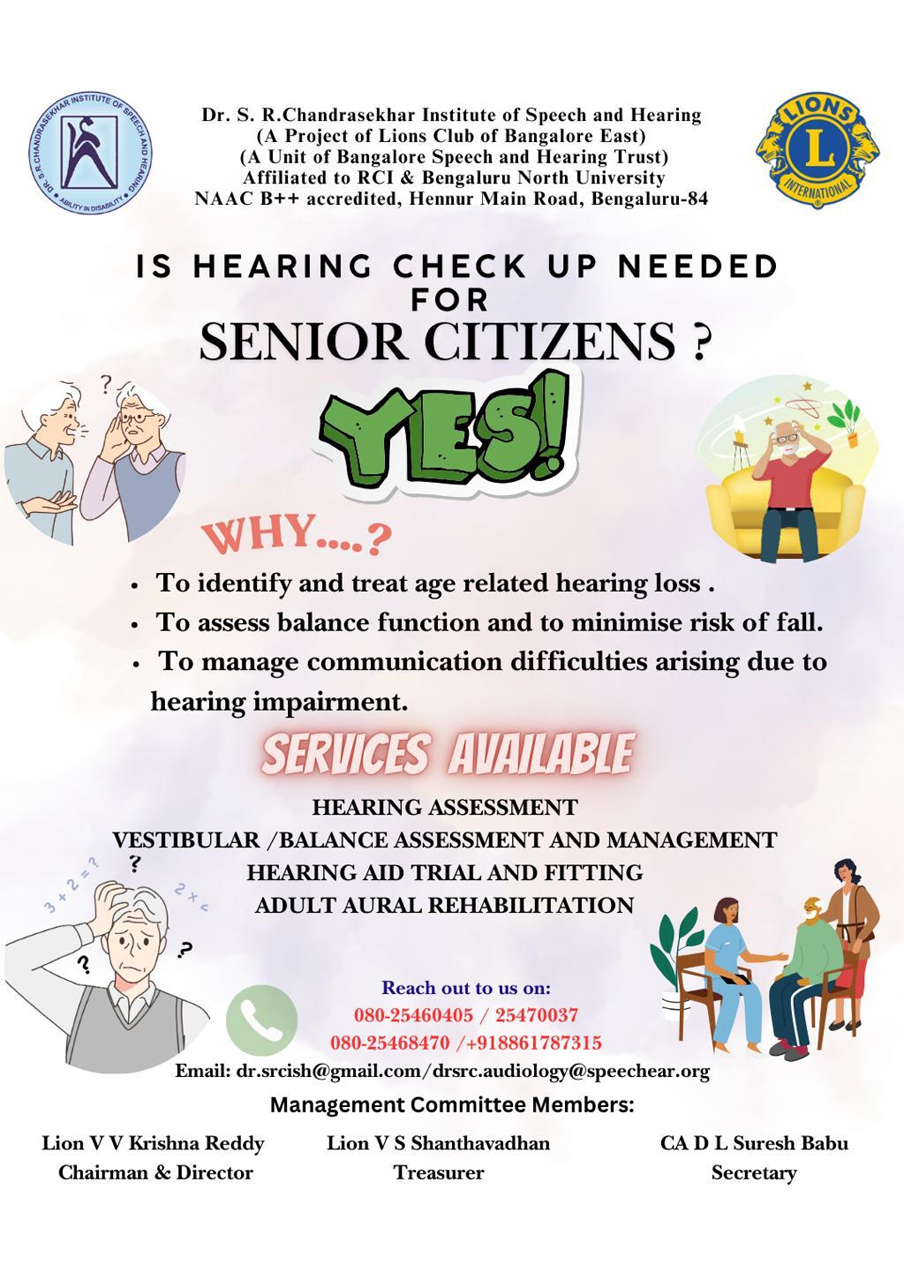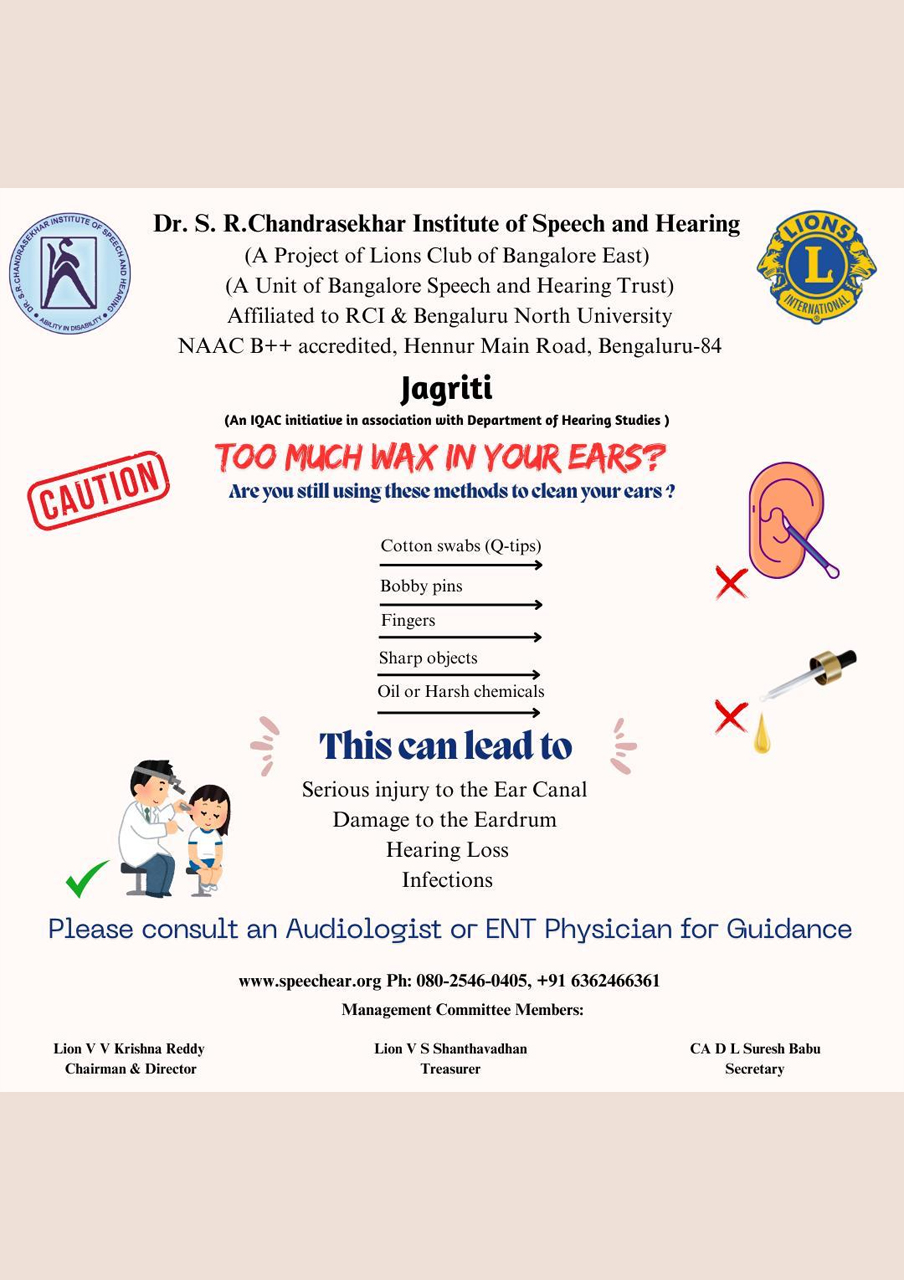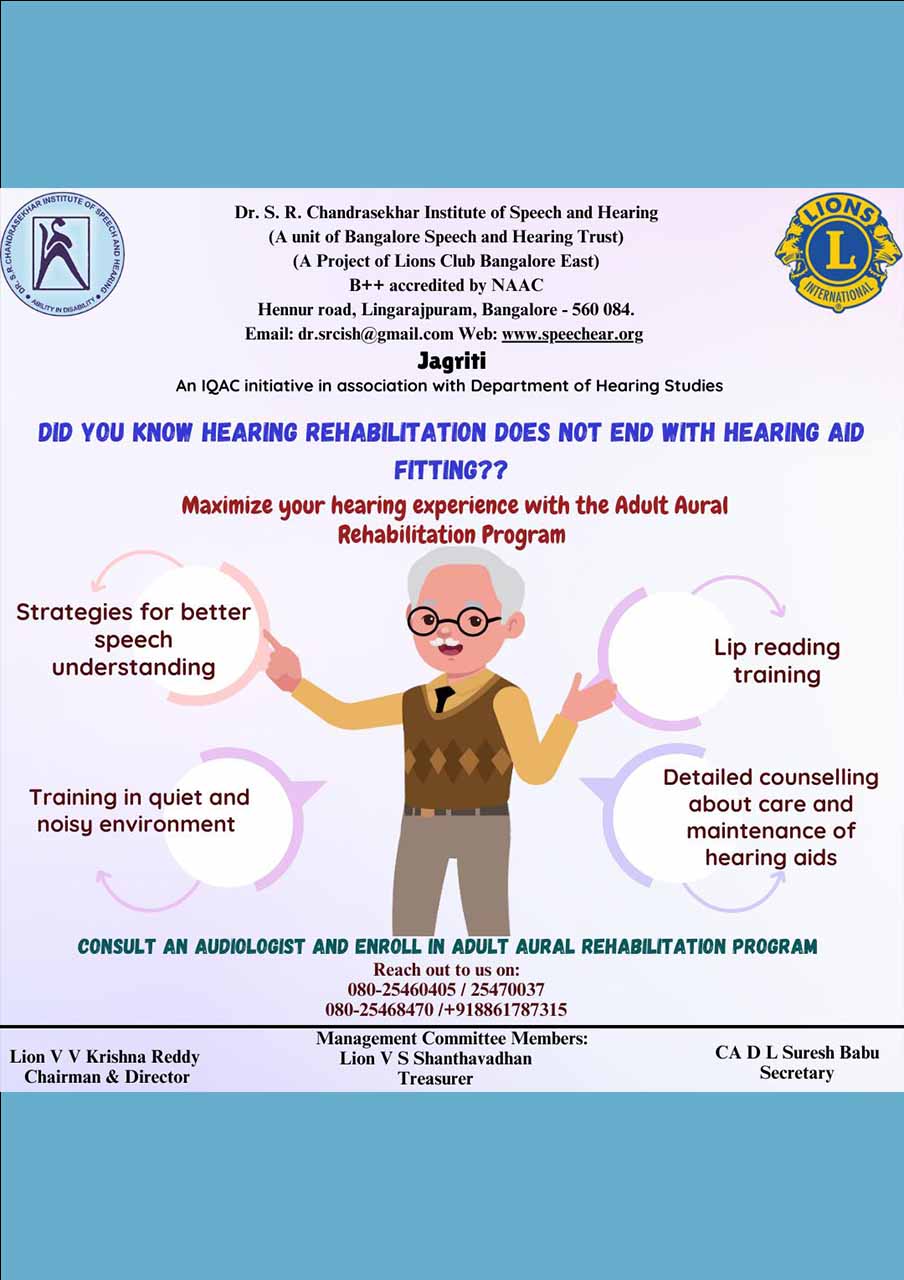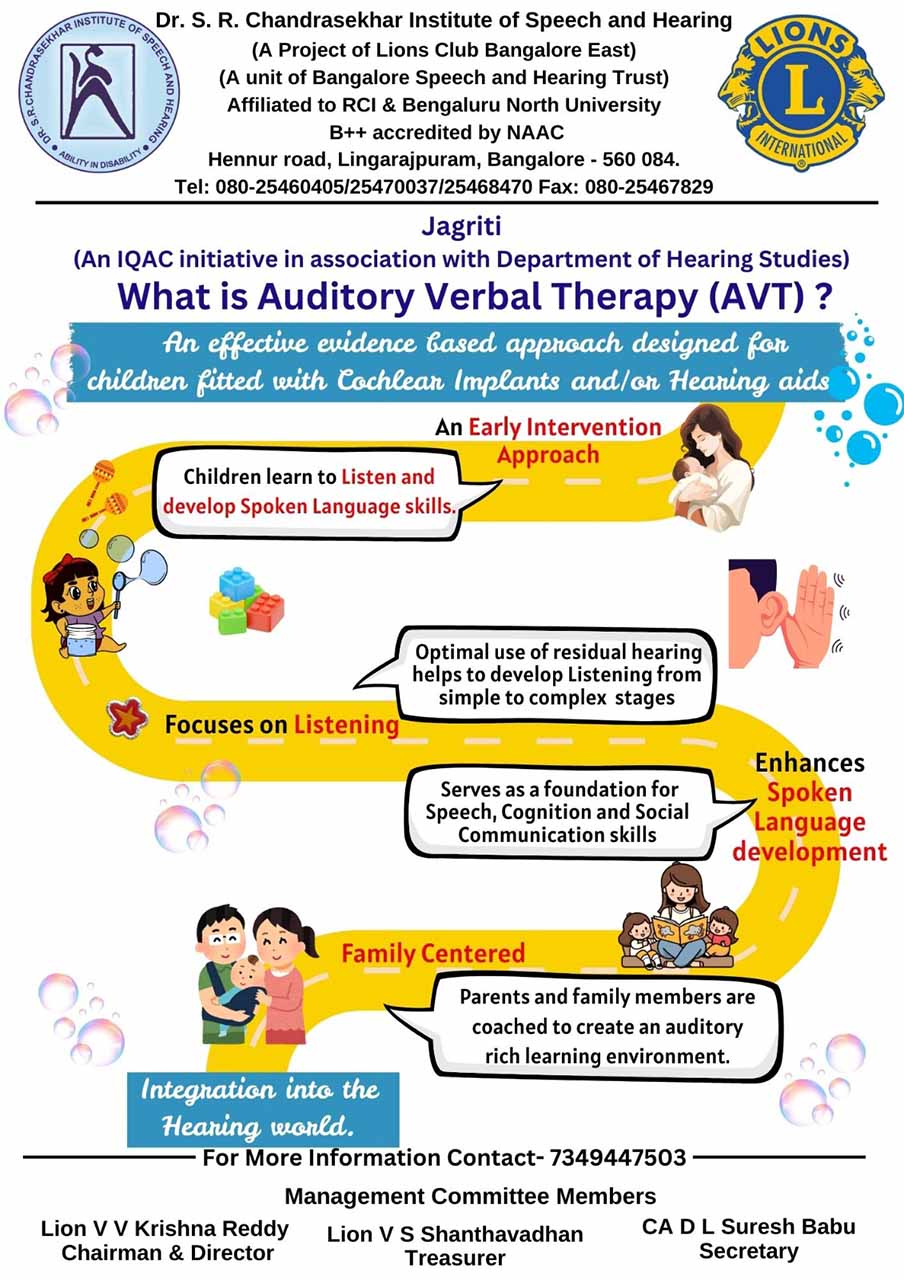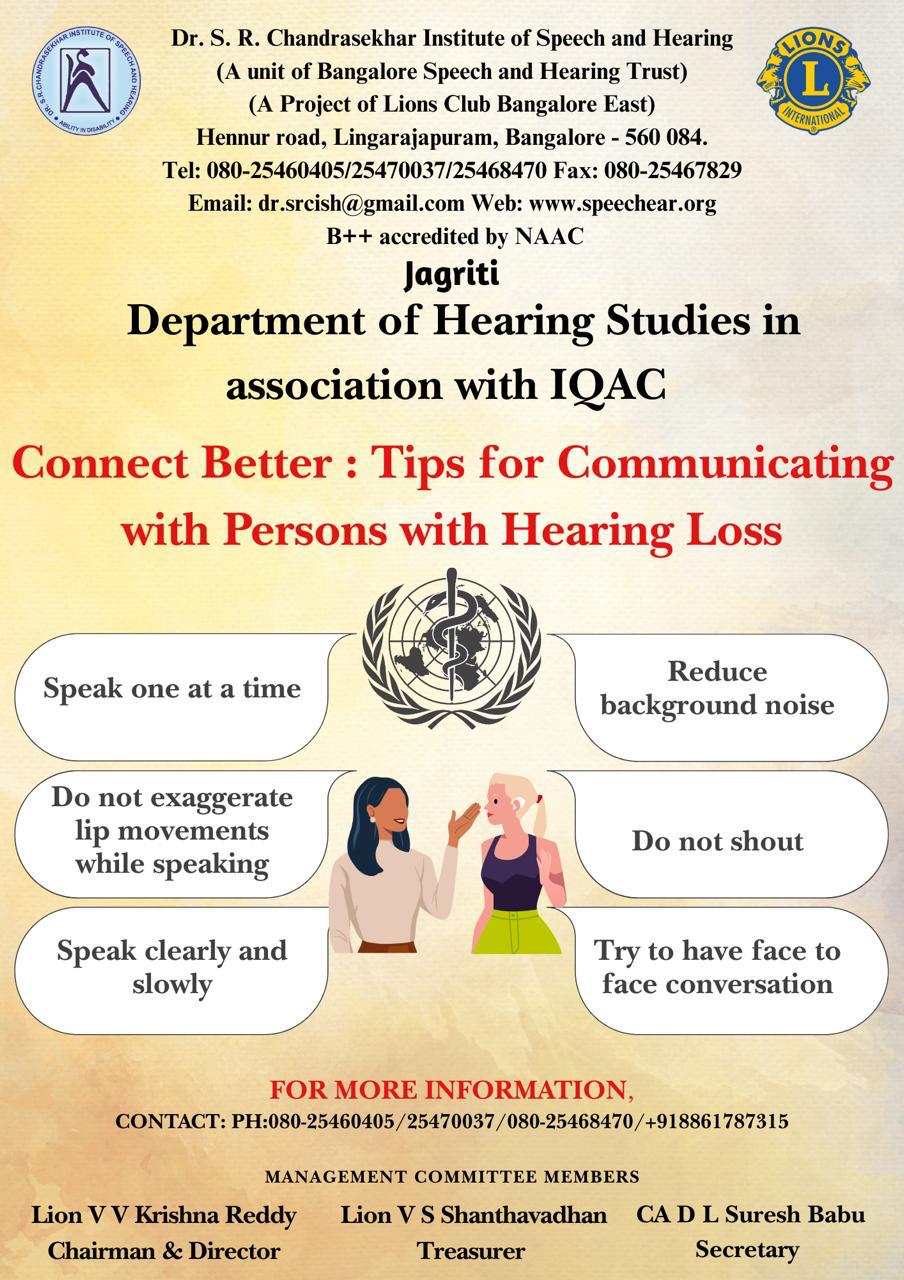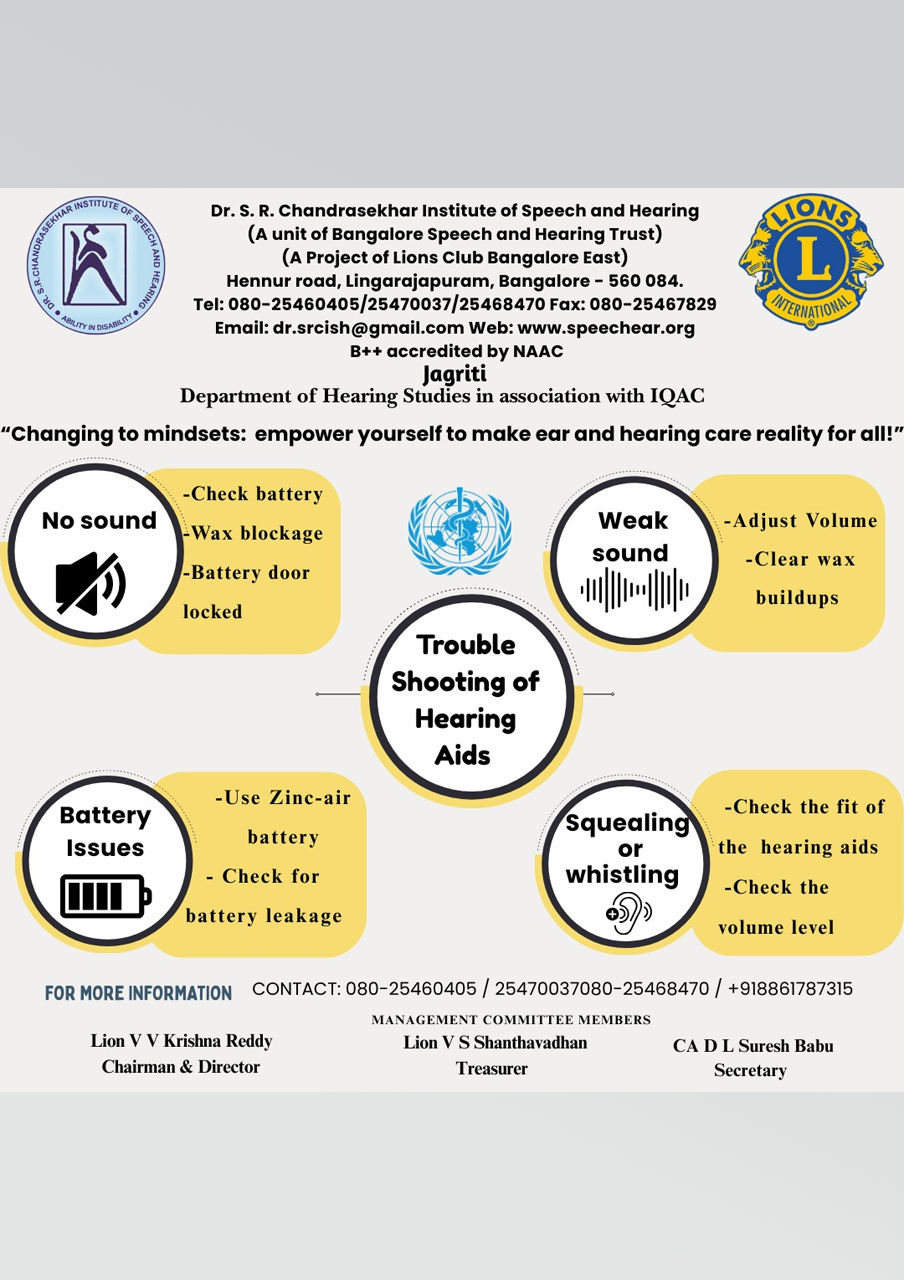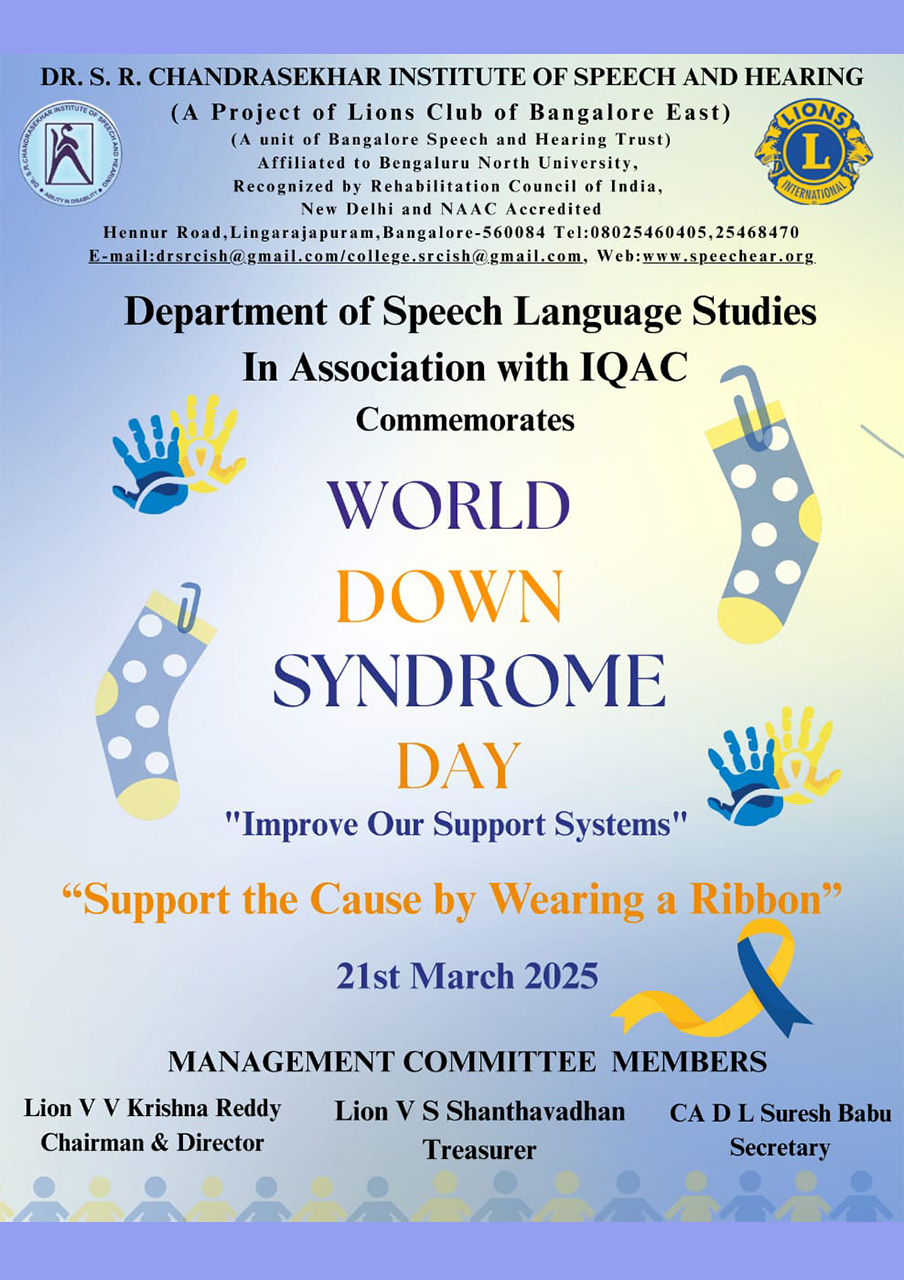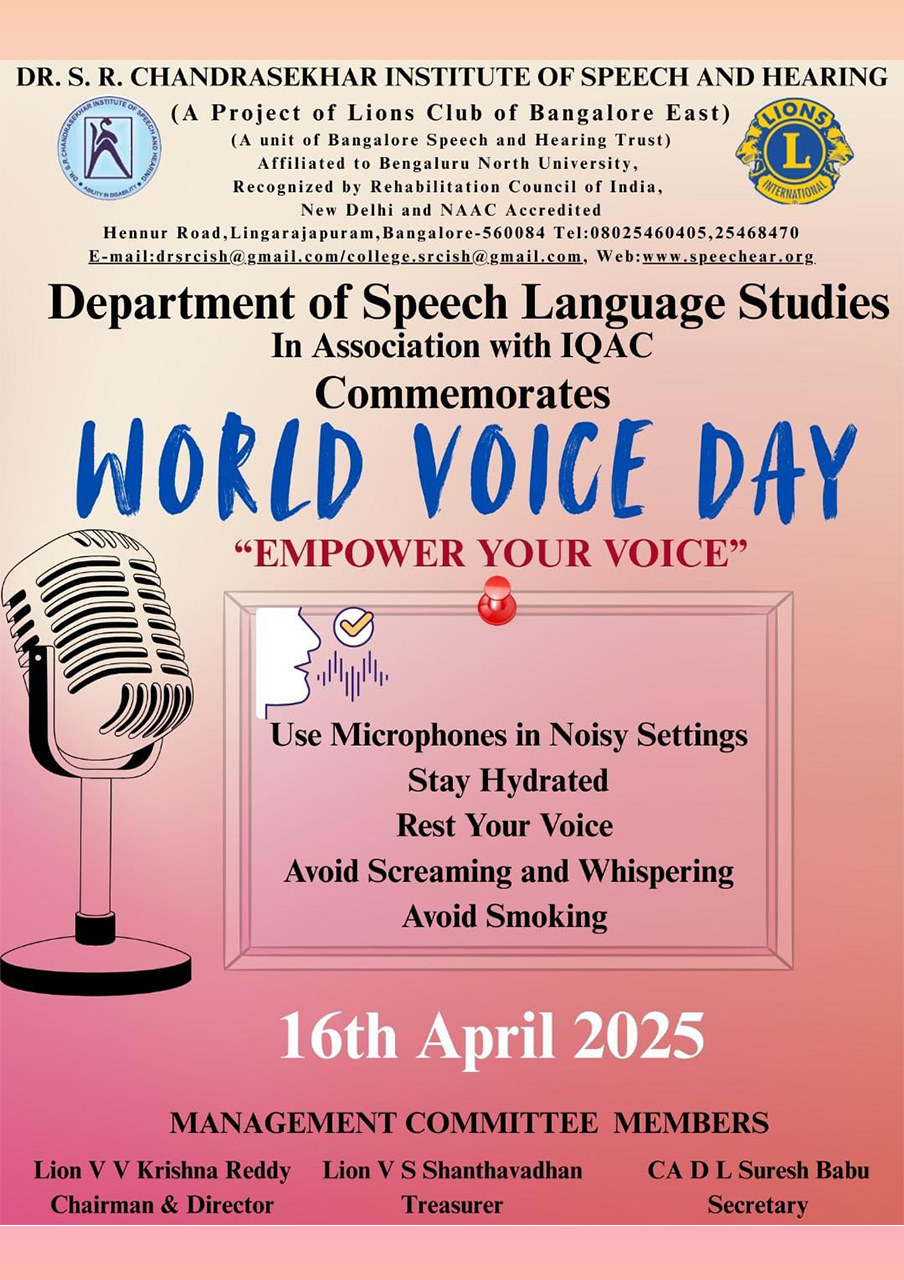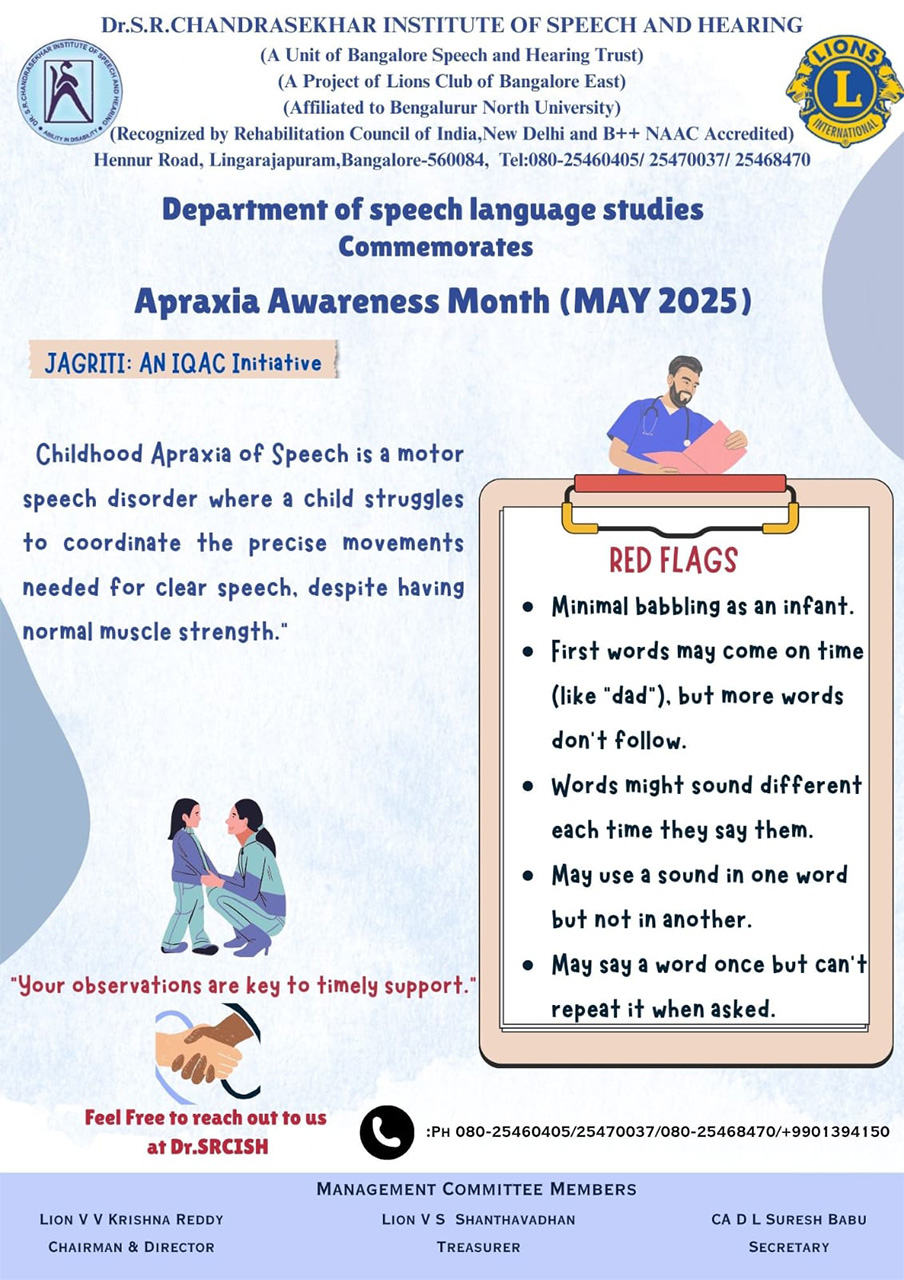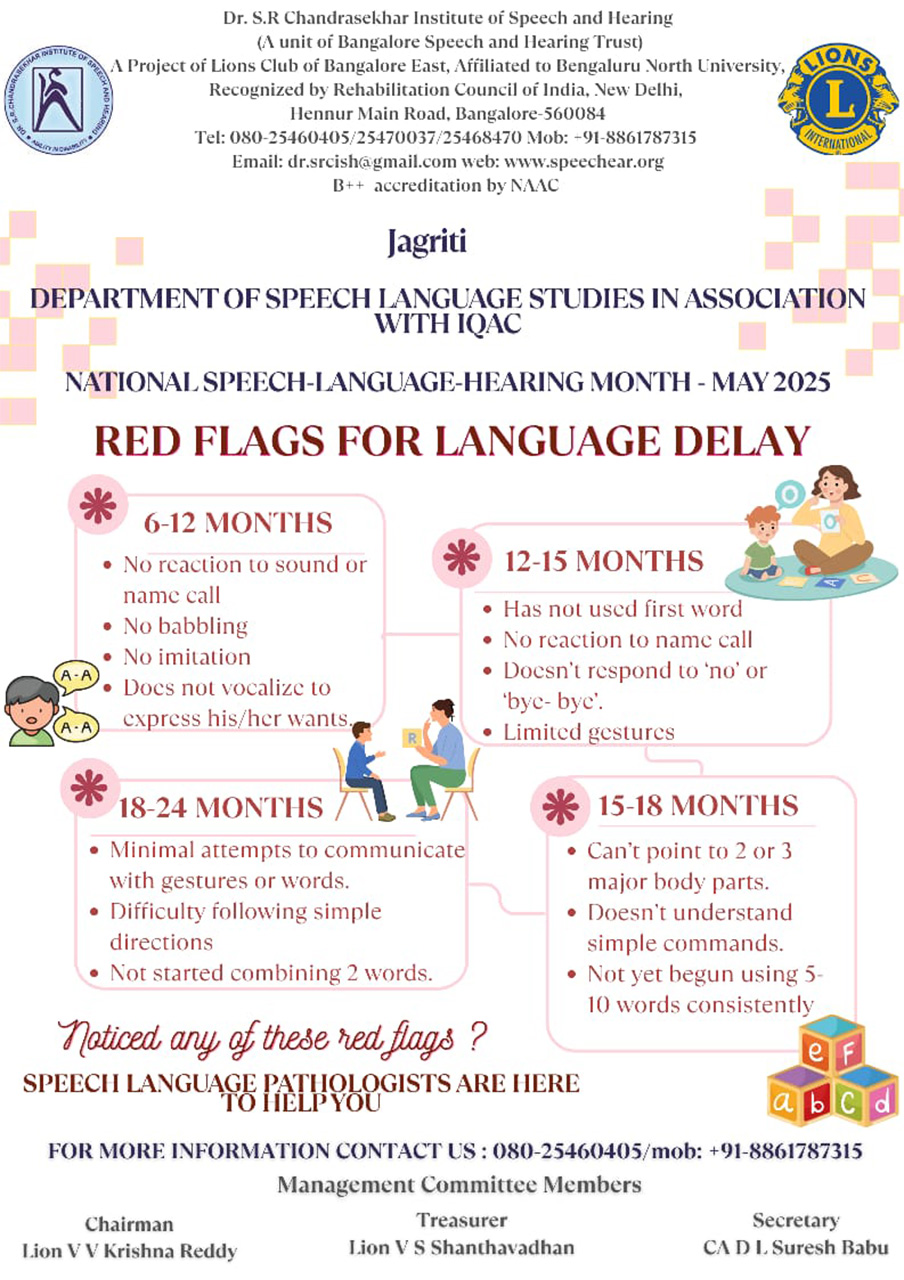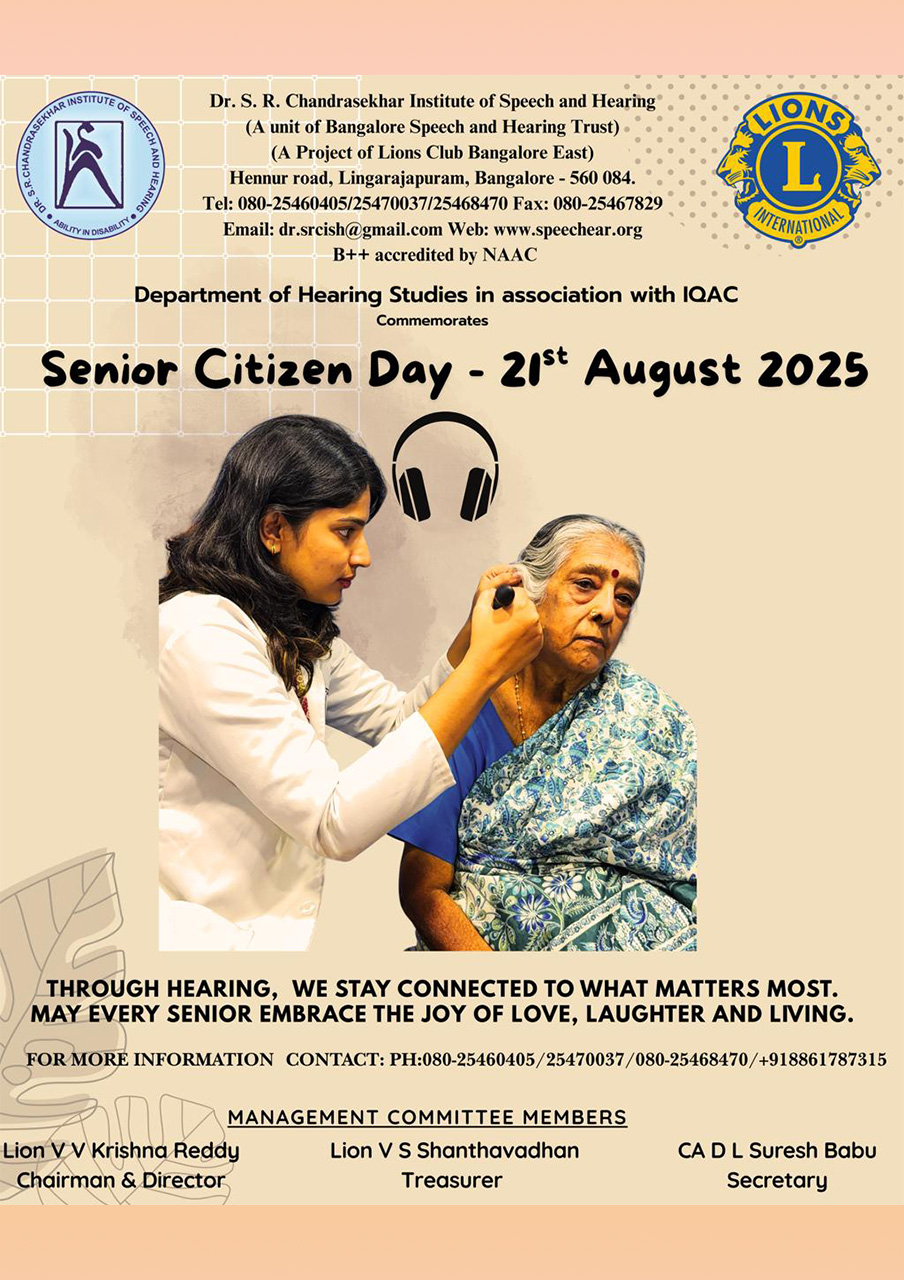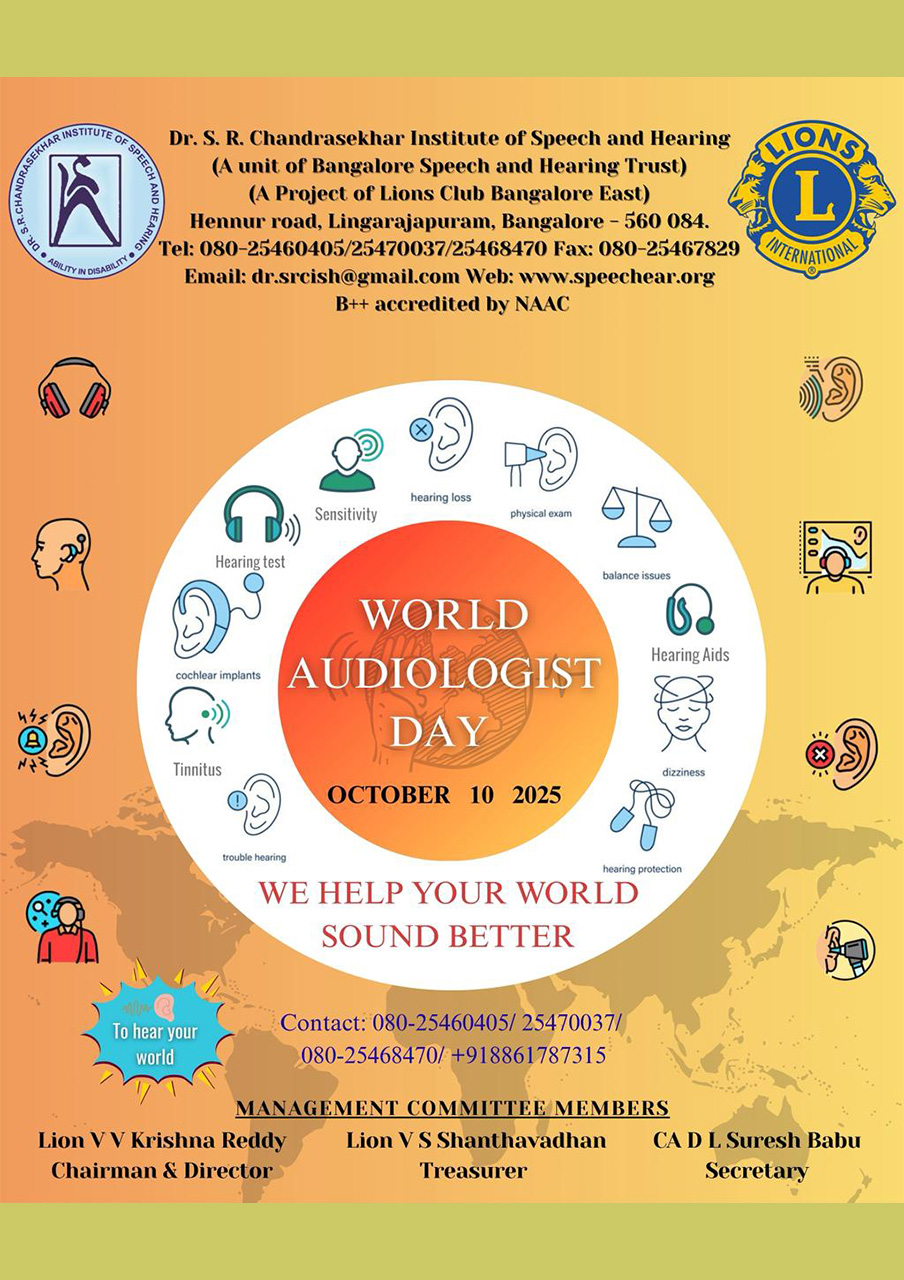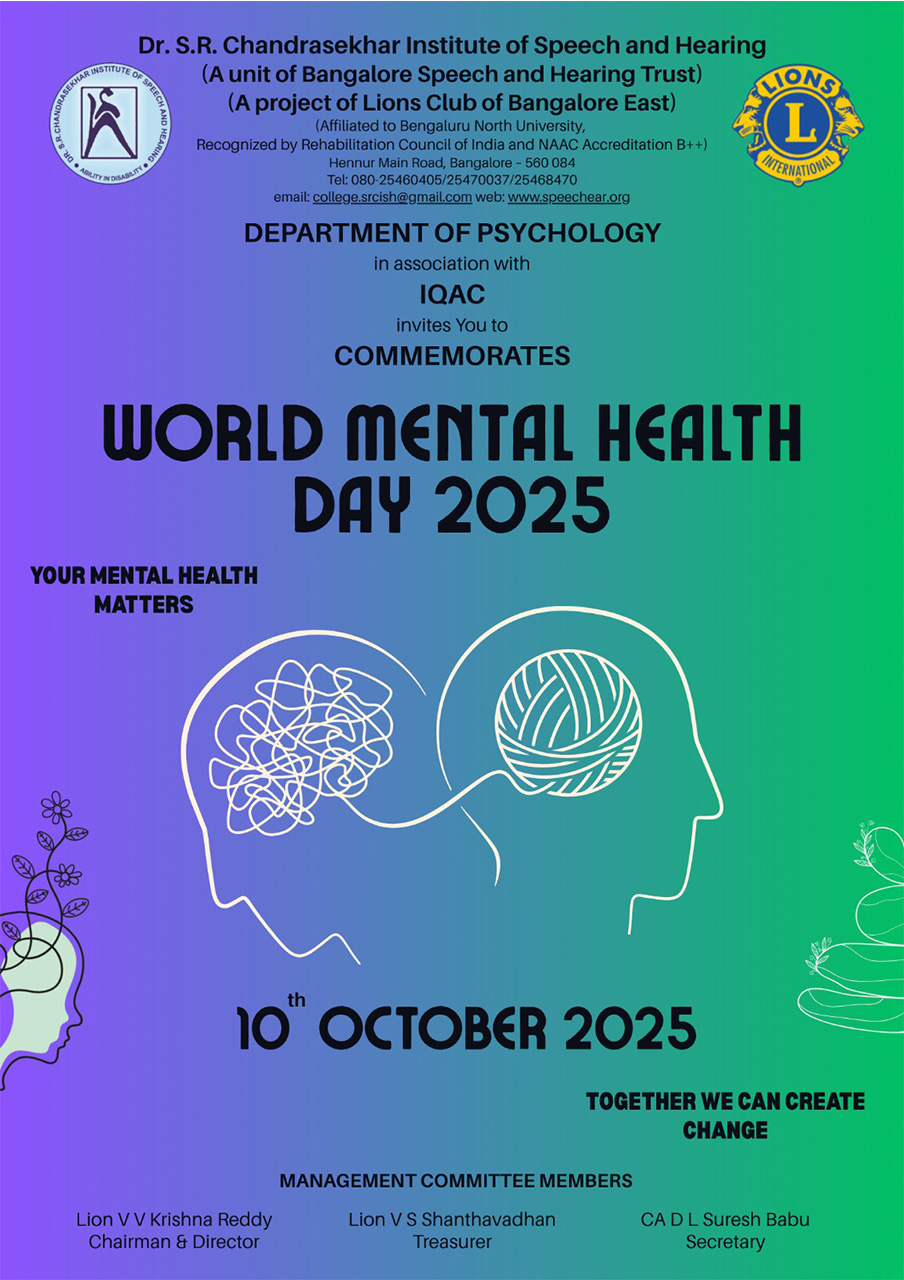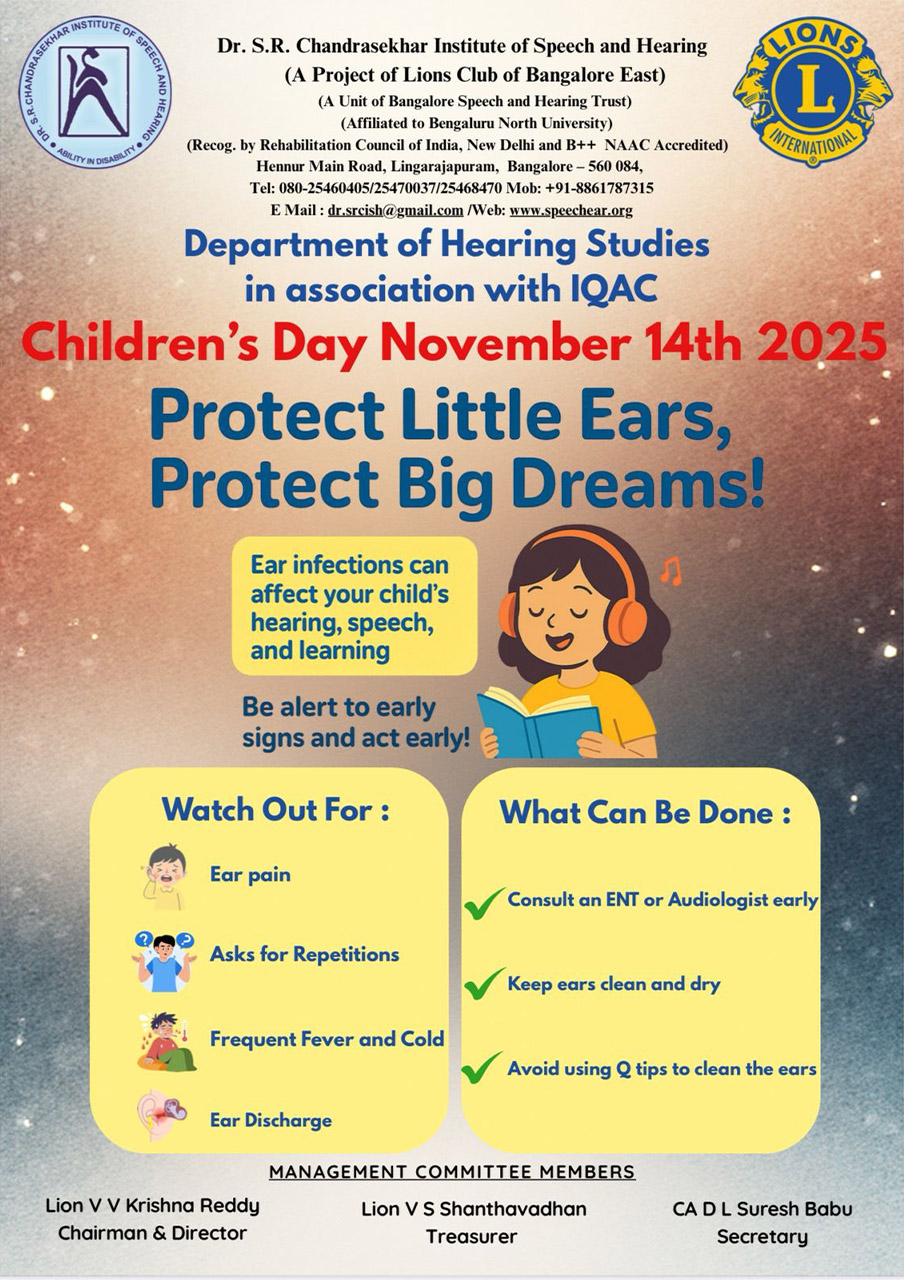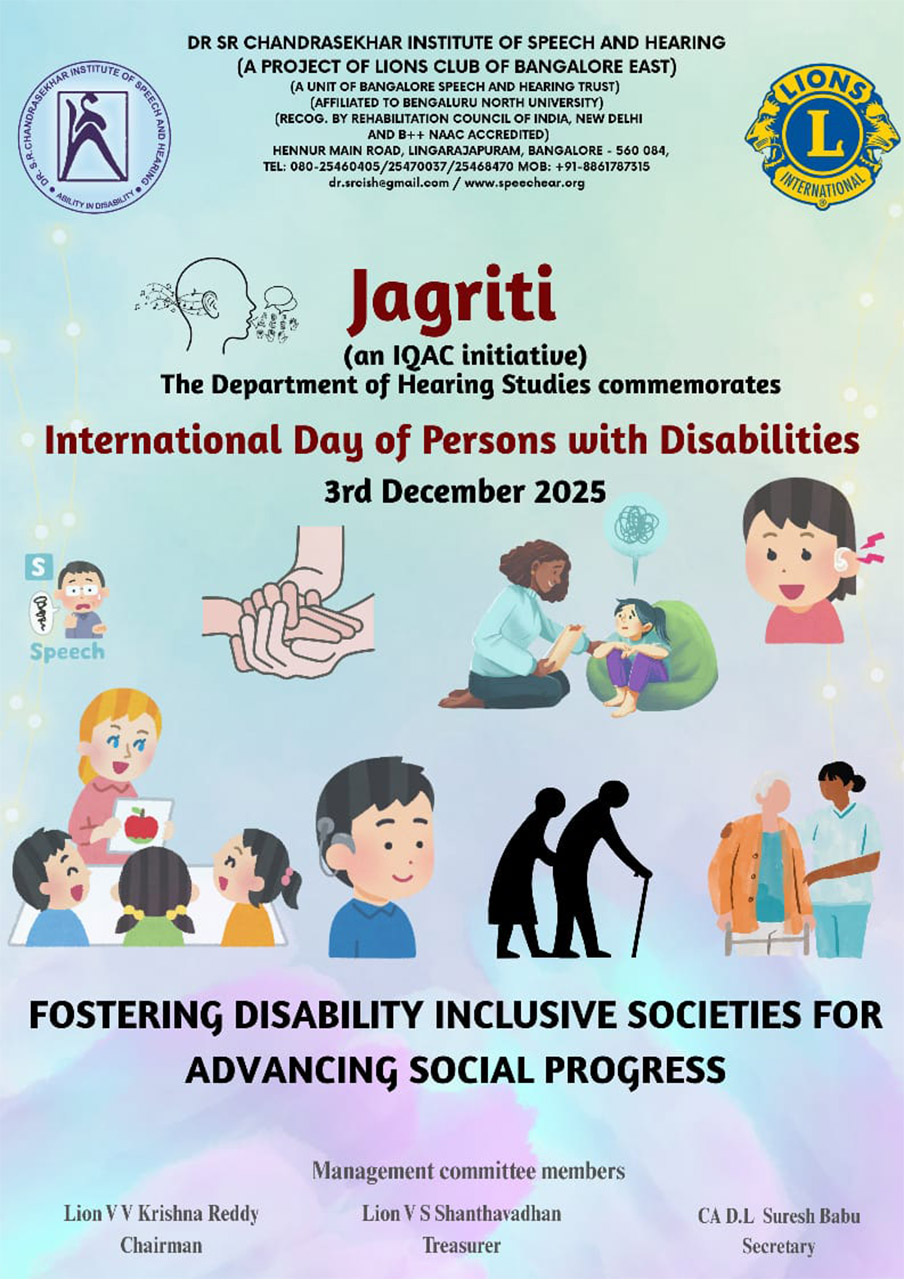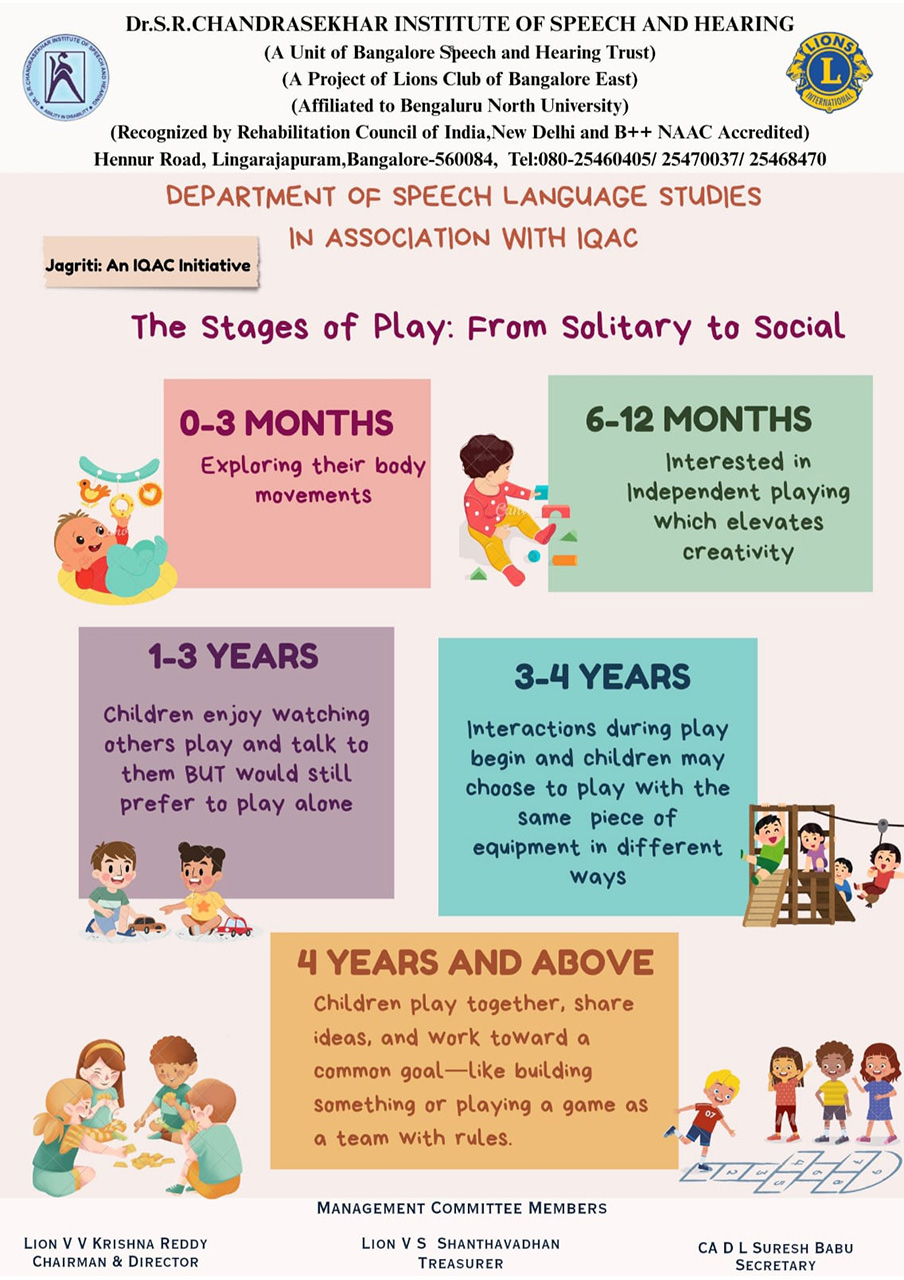







Training Centre








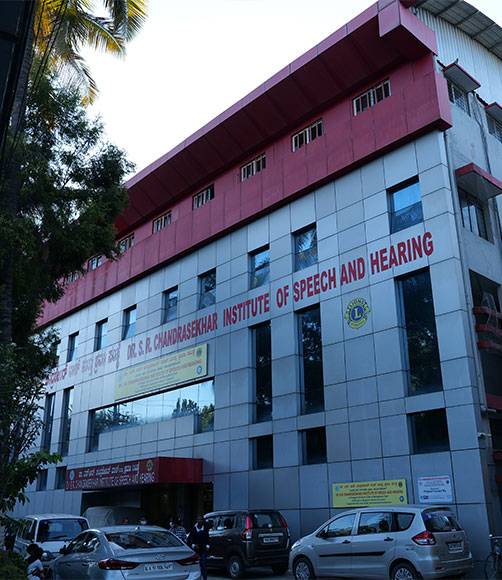
Welcome to Dr. S. R. Chandrasekhar Institute of Speech and Hearing
Dr. S. R. Chandrasekhar Institute of Speech and Hearing (Dr.SRCISH), located in Bangalore, stands tall as a prominent institution, renowned for its excellence in both clinical and academic domains within India.
Established in the year 1977, Dr.SRCISH, has consistently demonstrated an unwavering commitment to serving individuals with communication disabilities. The scope of its services extends to a diverse range of conditions, including hearing impairment, voice disorders, stuttering, cleft lip, cerebral palsy, mental retardation, learning disability, autism spectrum disorders, and post-stroke communication disorders.
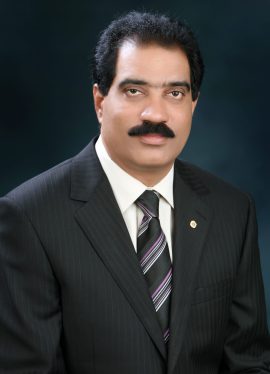
Lion V.V. Krishna Reddy
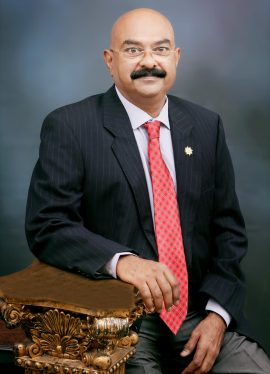
Lion V.S. Shanthavadhan
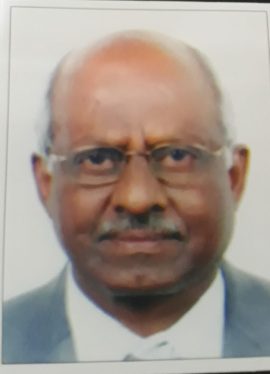
CA D.L Suresh Babu
Management Committee Members
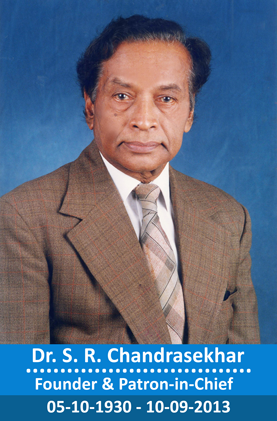
Dr. S. R. Chandrasekhar was a highly reputed E.N.T. surgeon in Bangalore. Born on 5th October 1930 in Mysore, he completed his early education in Bangalore and obtained his medical degree from Madras Medical College in 1956. He later proceeded to England for higher studies and become a Fellow of the Royal College of Surgeons (FRCS) in 1960, with specialization in E.N.T. He returned to India in 1961 and served as Professor and HOD of ENT, in Hubli Medical College, Bangalore Medical College and St John’s Medical college.
CALL US
Our Clinical Services
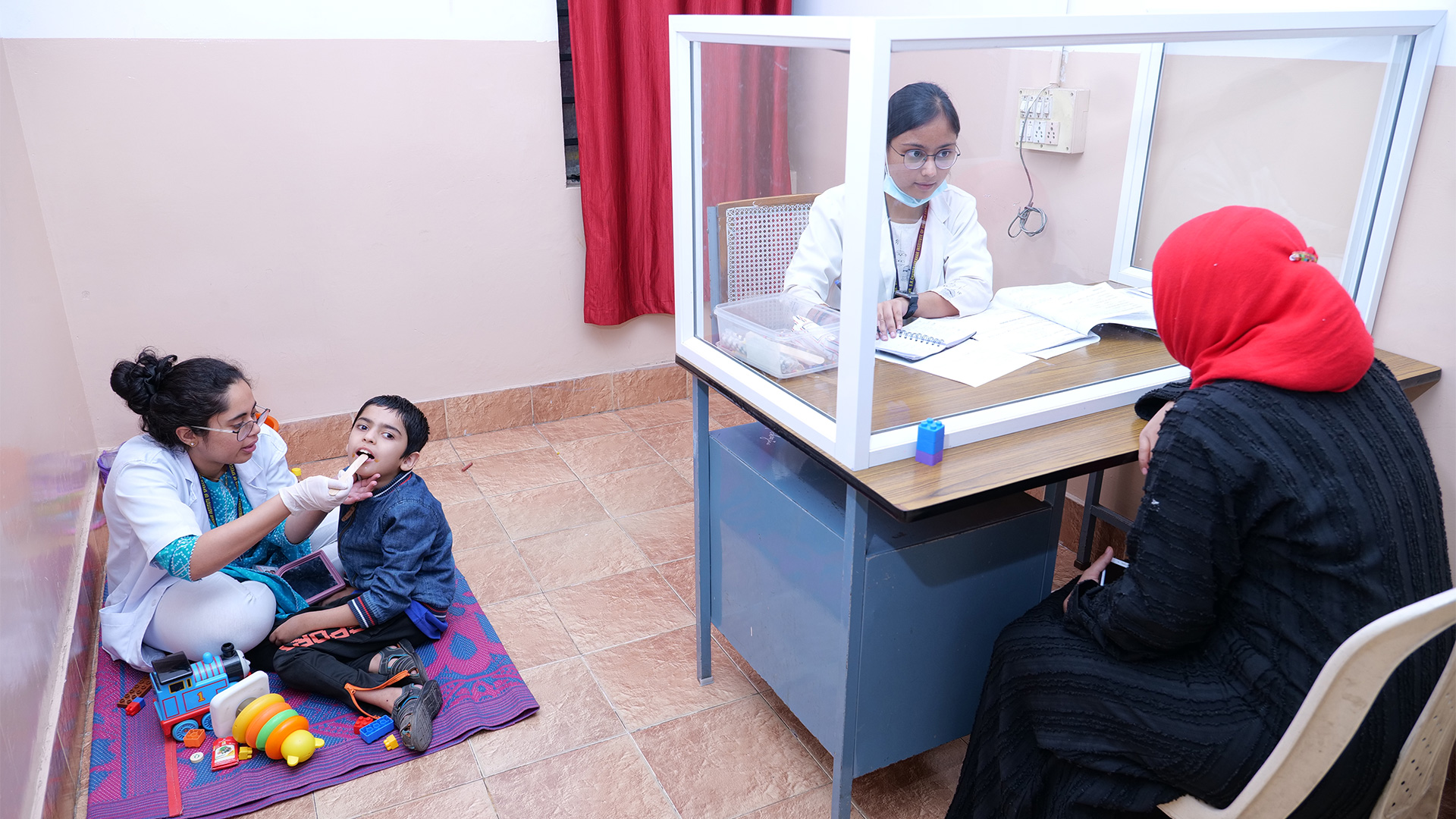
Speech and Language
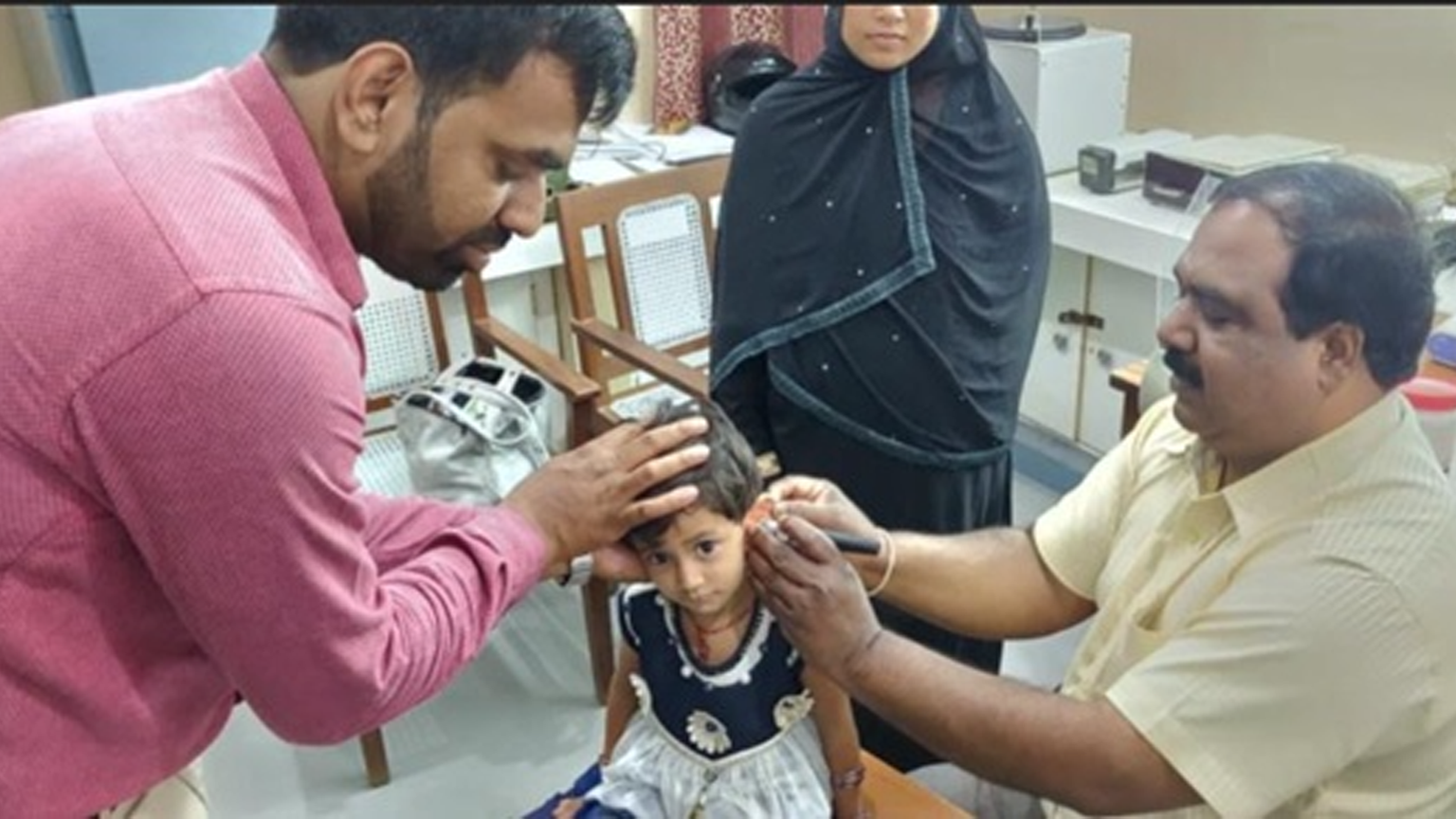
Hearing
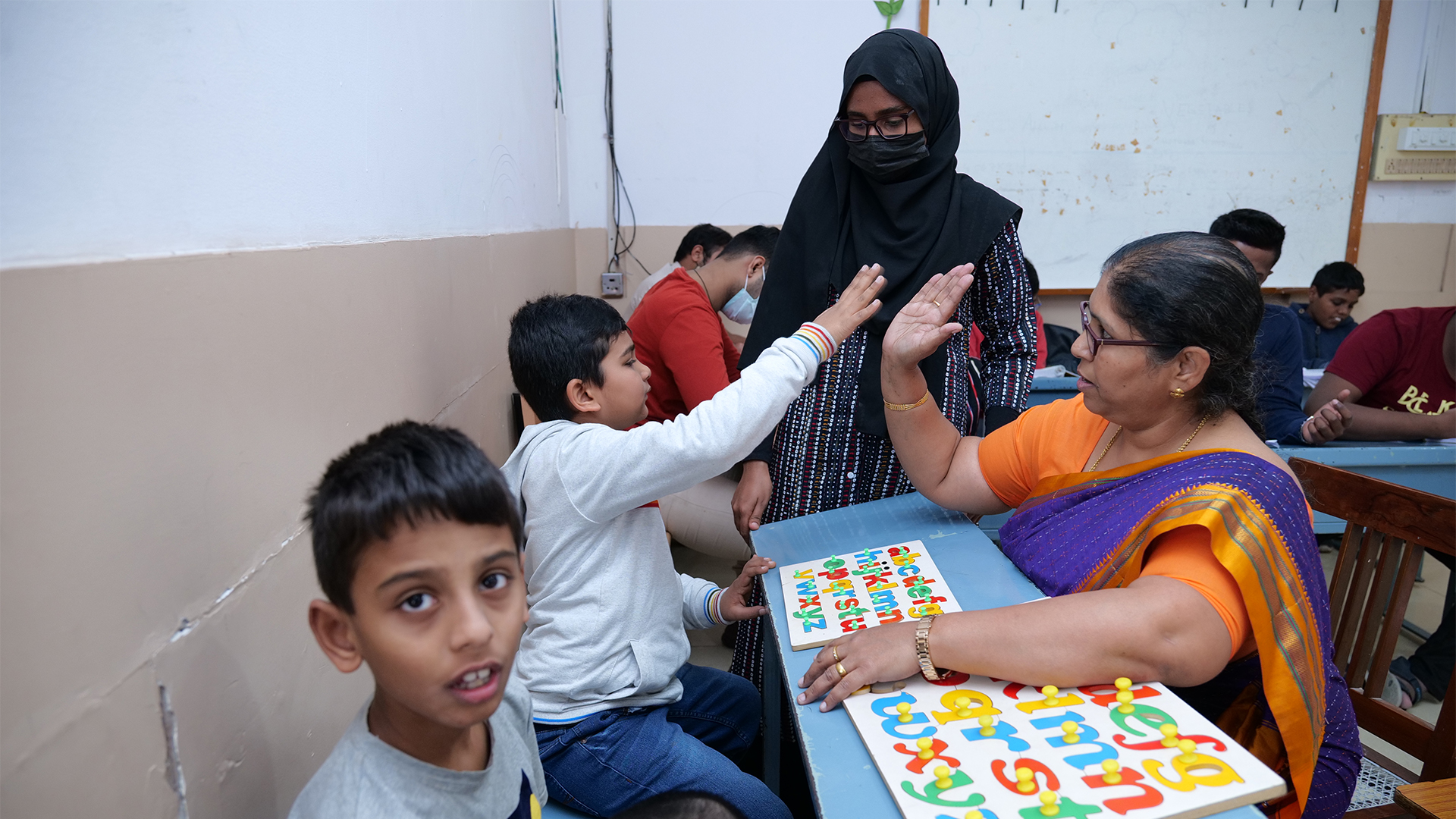
Psychology
Students
Life in Campus
Upcoming Events

Awareness Hub
Media Coverage
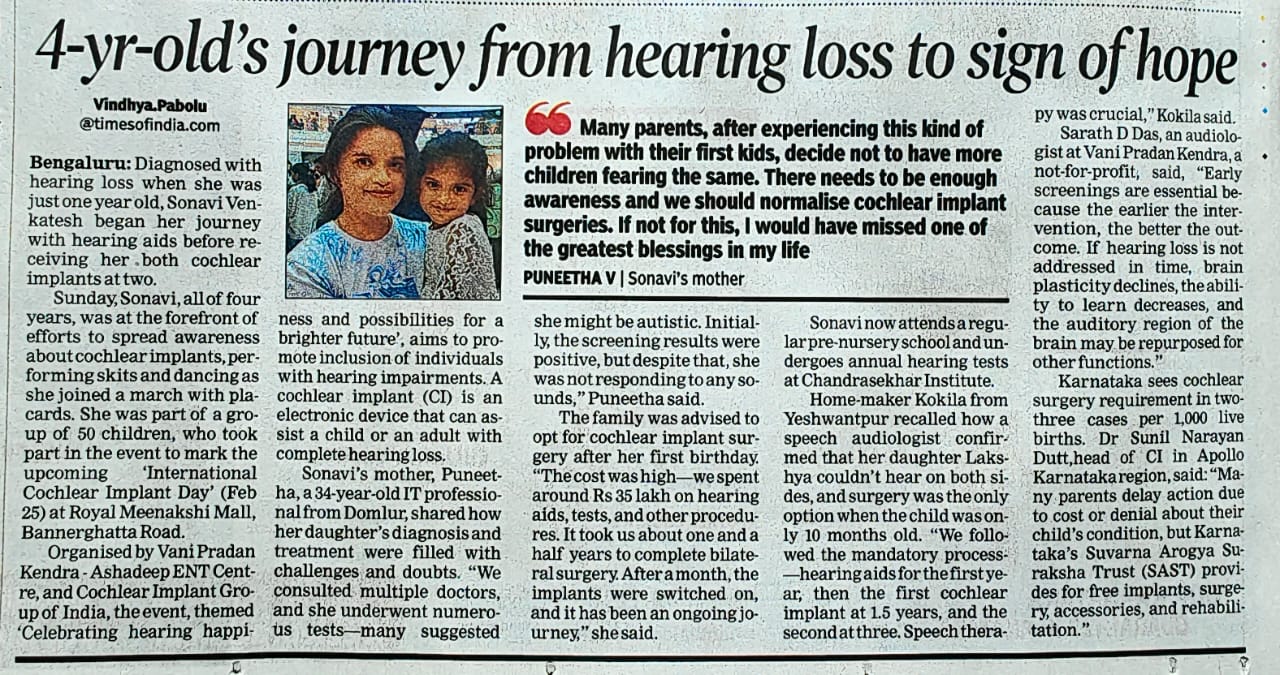

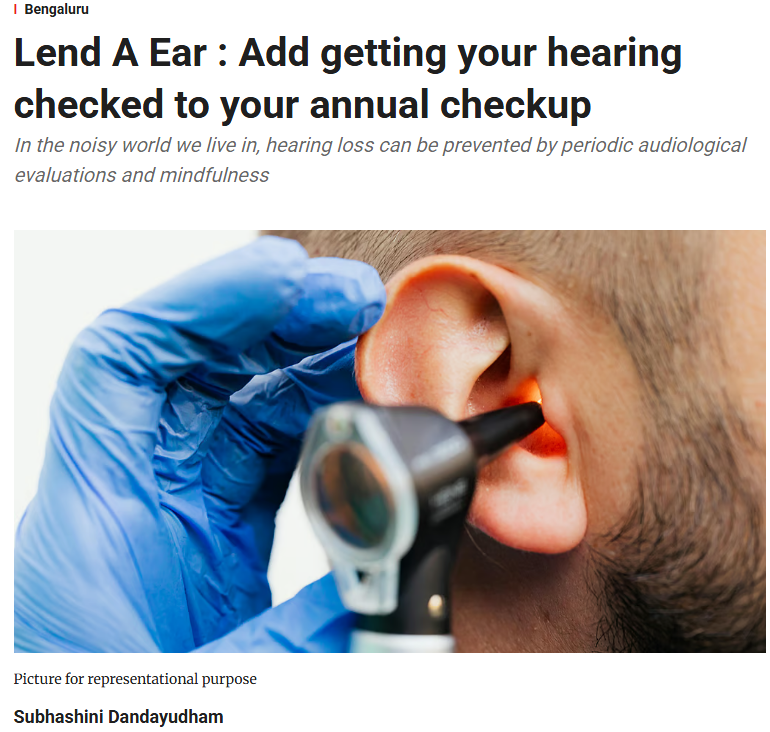
What comes to your mind when you hear the word ‘deafness’? Hopeful music in the background, with children wearing hearing aids and communicating with gestures?
Unfortunately, the mainstream portrayal of deafness has been often limited to this, while the management of deafness or hearing impairment is more advanced and will help in successful inclusion. March 3 of every year is commemorated as World Hearing Day and this is an annual campaign by the World Health Organisation for the prevention of deafness. Yes, you heard that right! Deafness due to various causes can be prevented.
How do I protect my hearing?
Following simple measures like avoiding loud noises, wearing earmuffs during concerts or a game in a stadium, limiting the use of listening devices or being mindful of volume levels in it, not pouring oil or water inside the ear canal, not inserting sharp objects to clean your ears and quitting smoking is a good start for it. But in the noisy world we live in, having periodical audiological evaluations is the best way to check your hearing capacity. Master health check-ups have become a norm which includes vision and dental, so why not hearing?
Enquire about it with your health provider and include it in your annual health screening to seek early intervention. Often people wait until it is too late and seek an audiologist’s support which can be avoided if you proactively choose to follow these simple steps alongside annual check-ups. It is natural that with ageing, hearing capacity may reduce but with early intervention and hearing aids, the outcomes are excellent. If you have an elderly individual at home, getting their hearing checked up is of paramount importance. Our hearing system is not just limited to the soft resilient ears – it has complex nerve connections to the brain and studies say that untreated hearing loss can lead to cognitive decline and social isolation. There is also the famous phrase, ‘Hearing health is brain health’ to evidence this. So, take action today and visit an audiologist to get your hearing checked!
What about children born with hearing loss?
As per a 2024 study, it is estimated that for every 1,000 newborns, five are born with permanent hearing loss. This unfortunately is not preventable. But solutions are available and acting fast is the key. Hearing opens the world of sound to the newborn, from the loving voice of the mother to the chaos of the traffic outside the home, babies stay connected to the environment and learn how to make sounds and eventually speak. The brain maximally learns skills, including speech and language up to three years of age. The most potent period is up to one year of age. So, intervention for hearing loss should be within this age. That is where newborn hearing screening comes into the picture. This will help in identifying whether a newborn needs immediate intervention or not. Several countries have the newborn hearing screening, but in India, some states have implemented this while others are striving towards it. The Joint Committee on Infant Hearing, a global committee that works towards identifying, treating, and monitoring infants with hearing loss recommends hearing screening by one month of age, audiological diagnosis by two months of age, and enrolment in early intervention by three months of age. Intervention can be hearing aids or cochlear implants, which are successful. With hearing aids or cochlear implants, at an early age combined with auditory training and speech therapy, the child can attend mainstream schooling and have a successful life comparable to their peers. Unfortunately, awareness on this is less despite the efforts of several government and non-government organisations.
How can I contribute to change?
Advocacy is key. Advocate for newborn hearing screening in every situation that warrants it. It is as important as undergoing vaccinations. Urge the policymakers to schedule it alongside vaccinations and vision examinations for newborns. This will improve the detection rates and invariably contribute to more infants receiving the intervention and a better chance of having a typical childhood. Remember their ears might be tiny but they matter a lot!

As the world observes International Noise Awareness Day on April 30, experts in Bengaluru have sounded a clarion call to be aware of the frequently overlooked risk of ear damage from headphones and earphones.
Devices such as earbuds and headphones play sound that ranges up to 130 dB in volume — something equivalent to being at live concerts and traffic intersections, says Varshini Ramdas, an assistant professor at the Department of Hearing Studies at the Dr S R Chandrasekhar Institute of Speech and Hearing in Bengaluru.
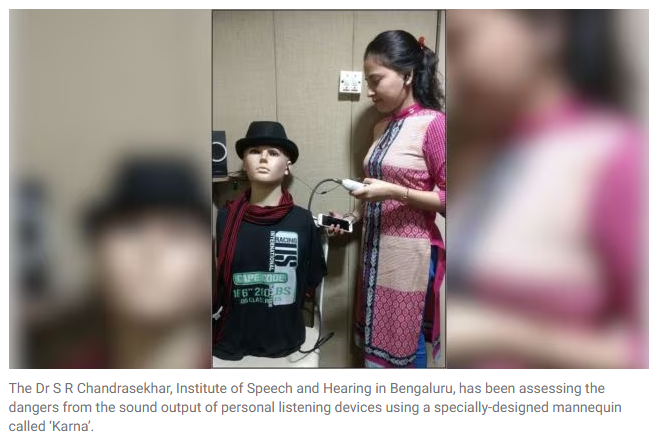
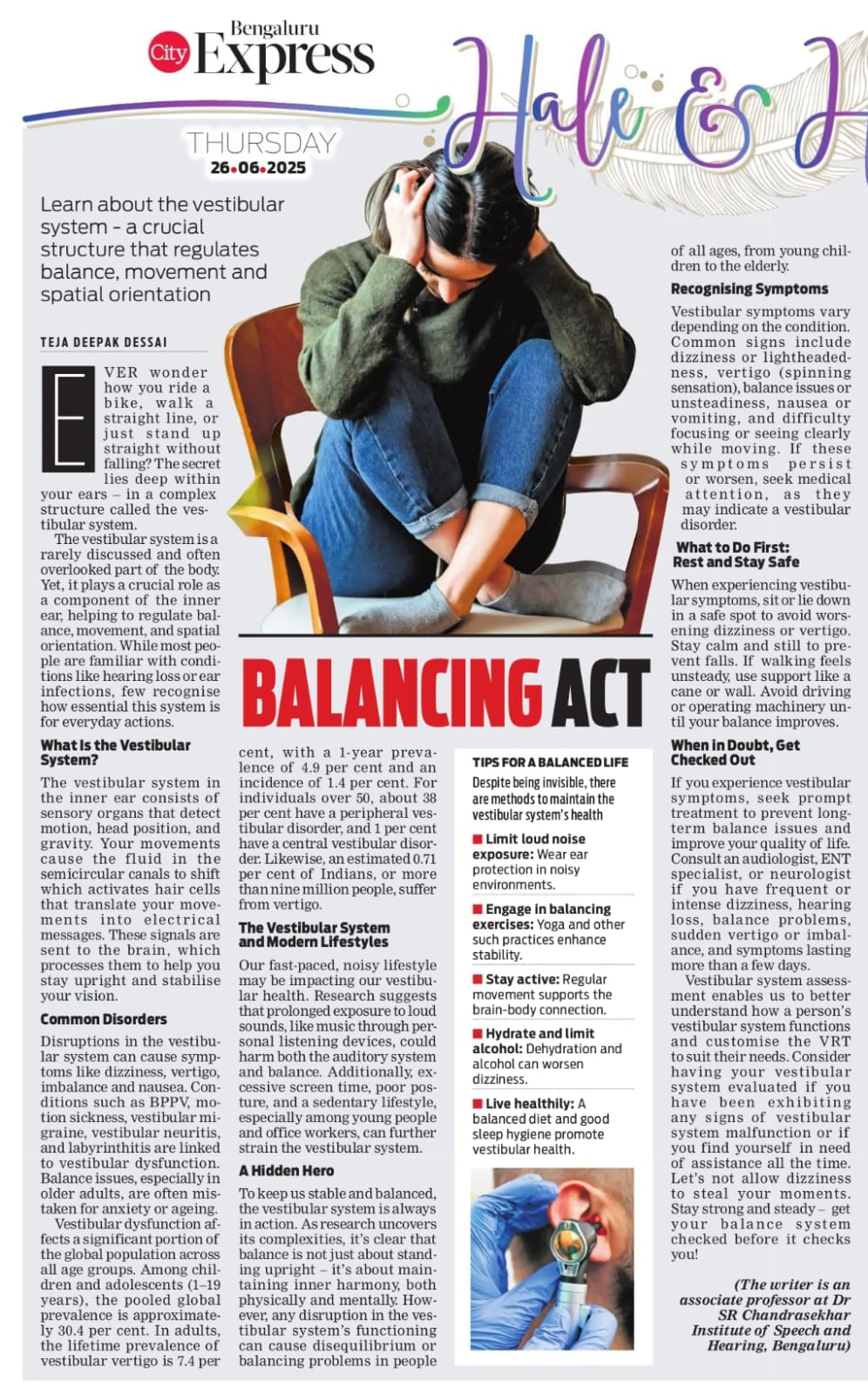
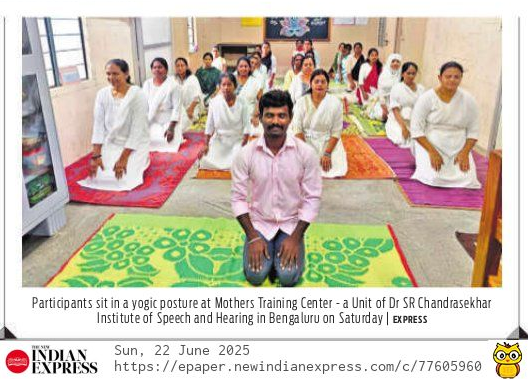
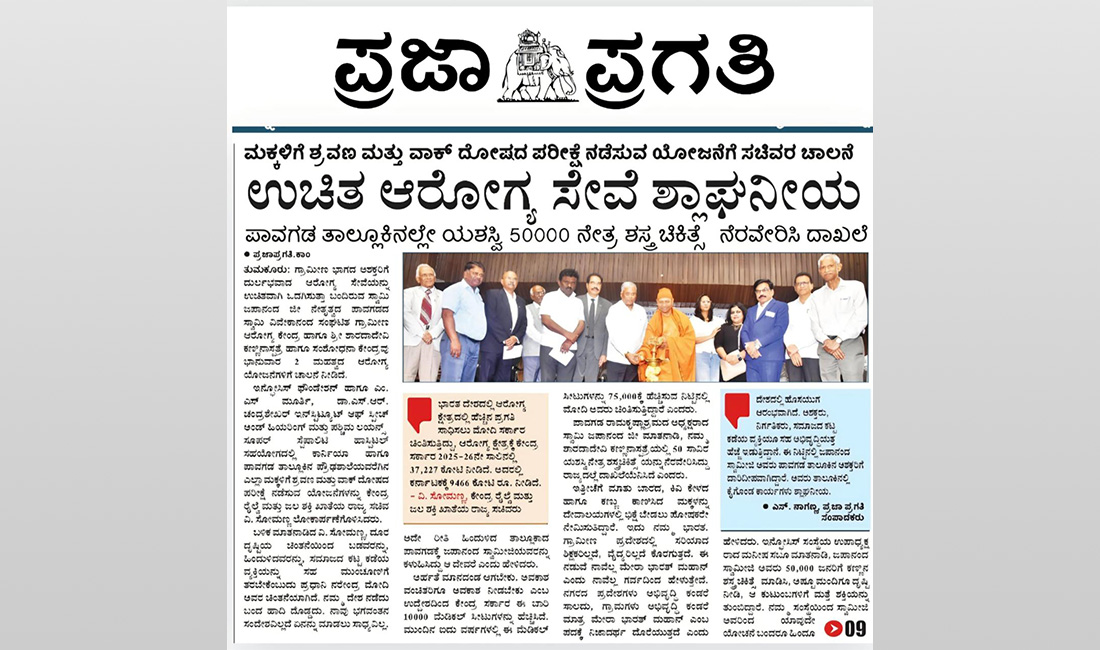
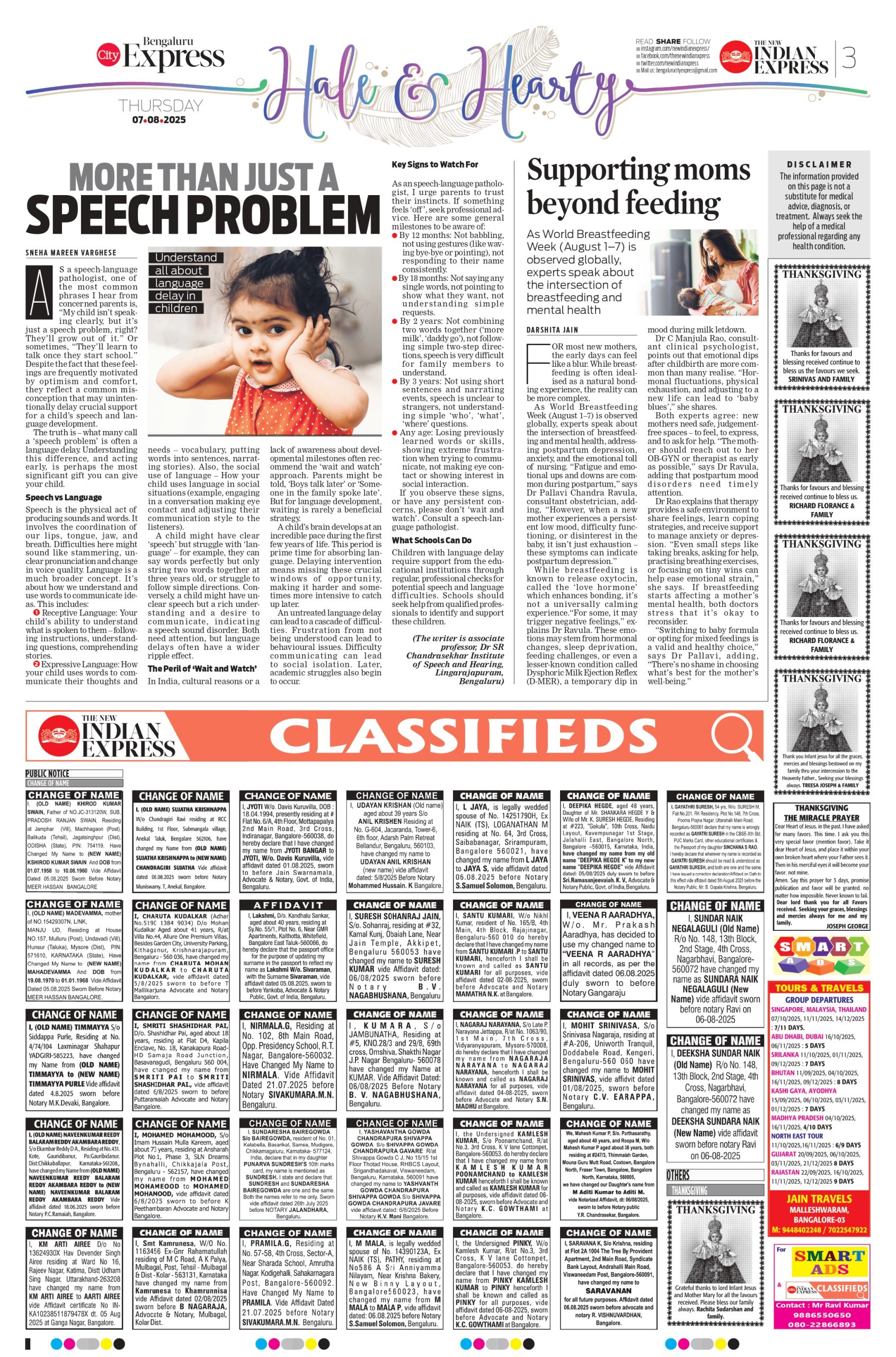
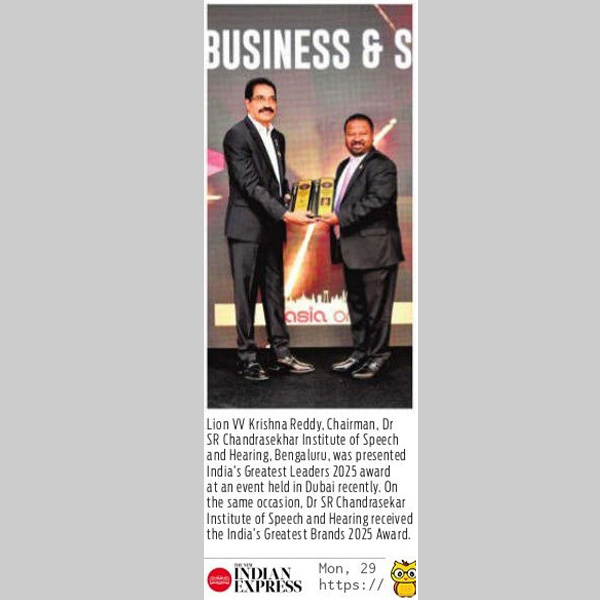
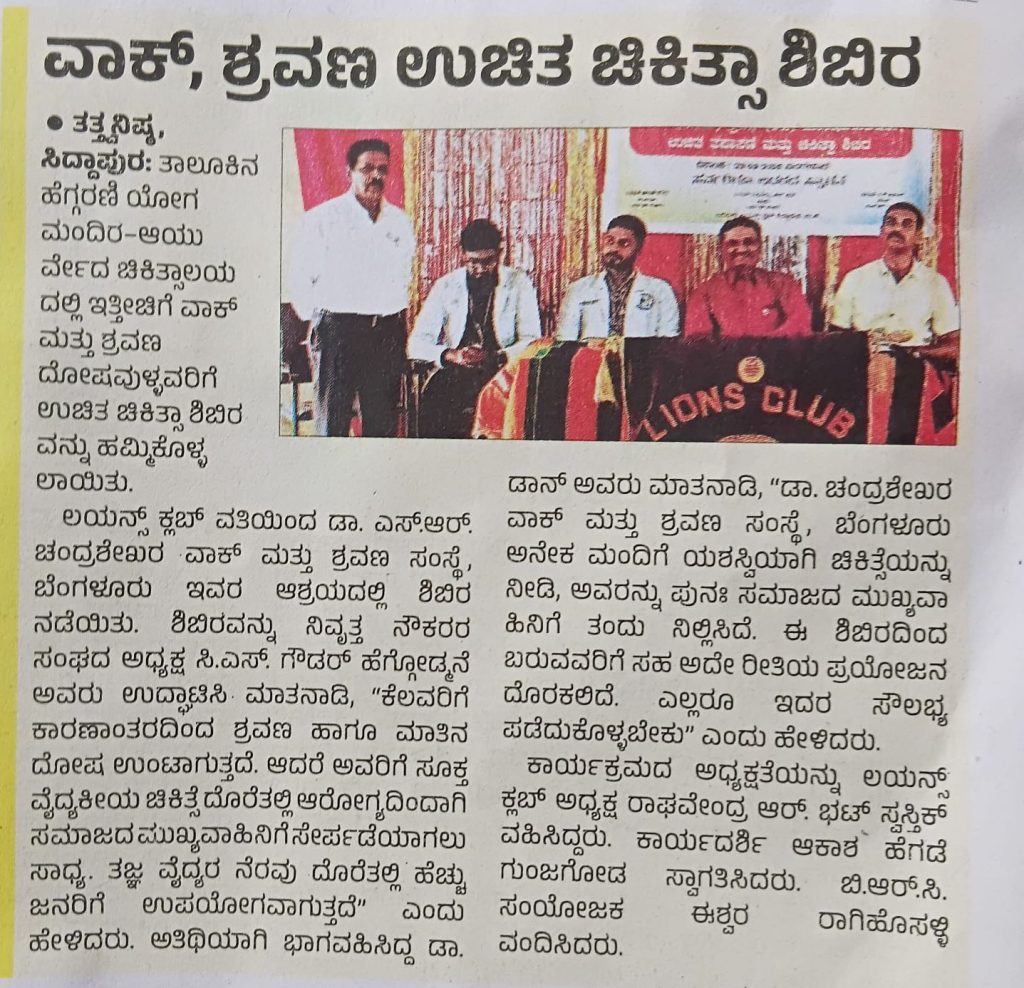
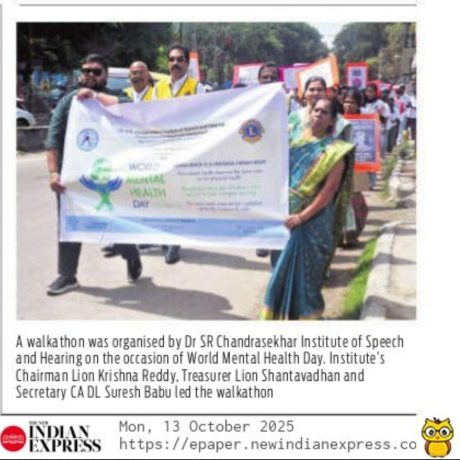
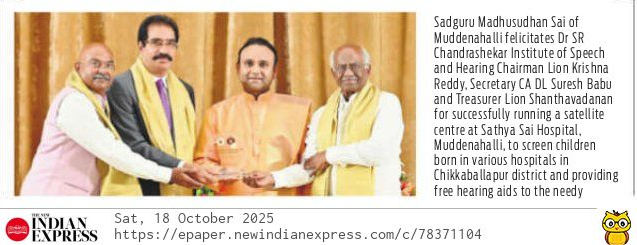

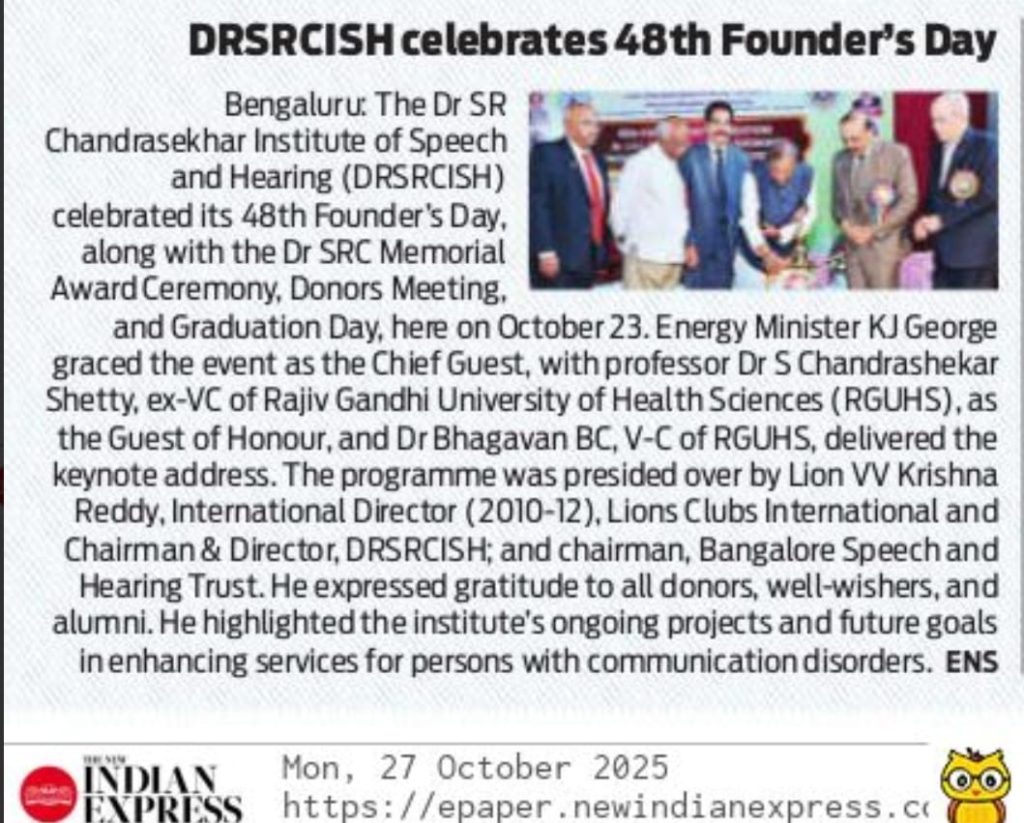
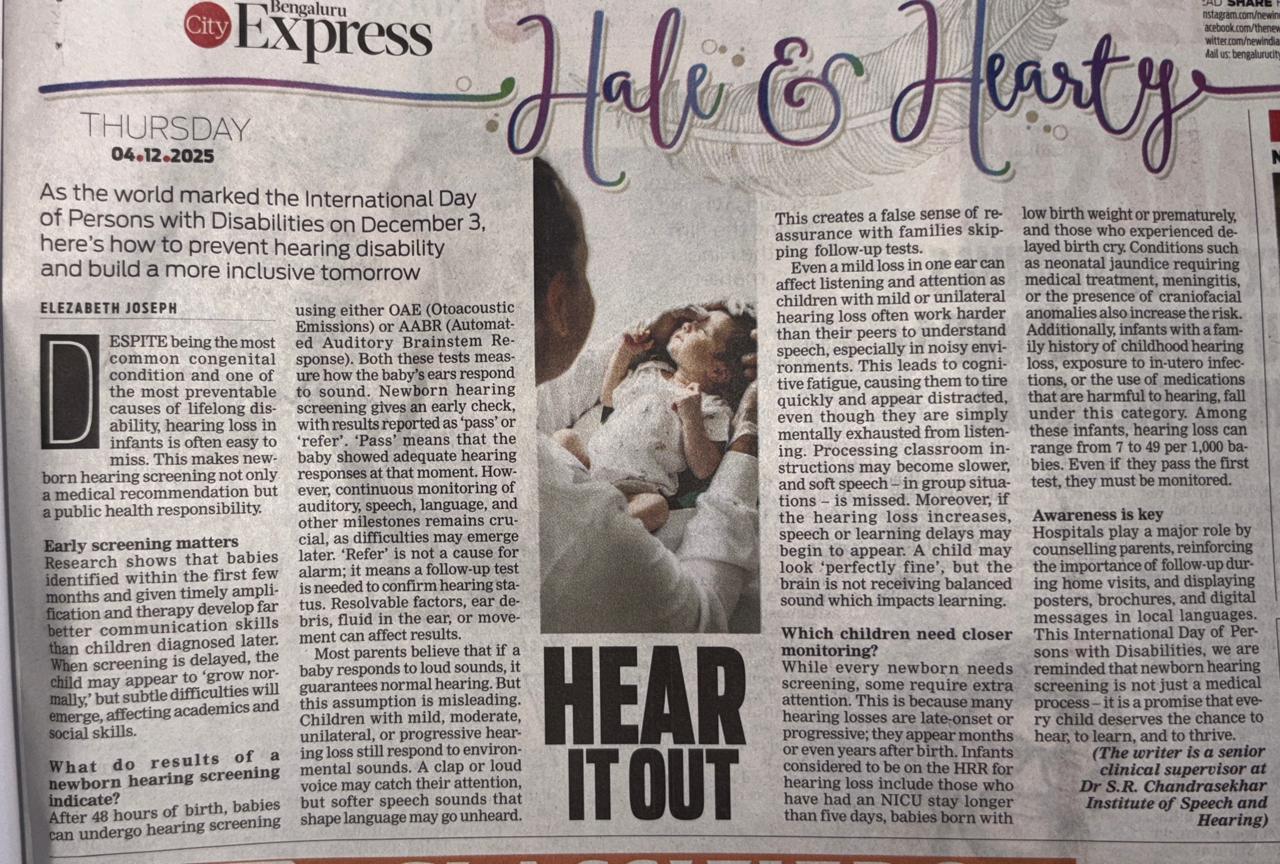
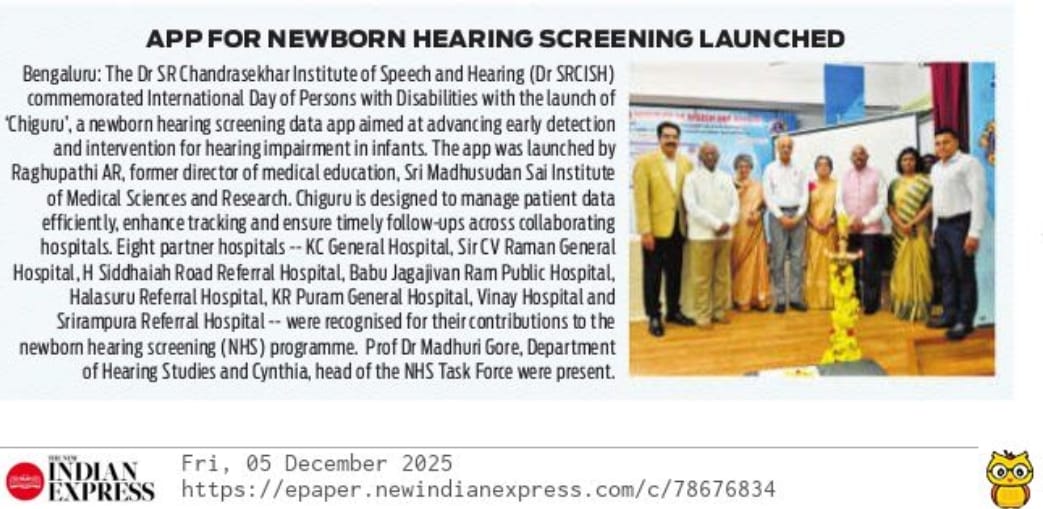
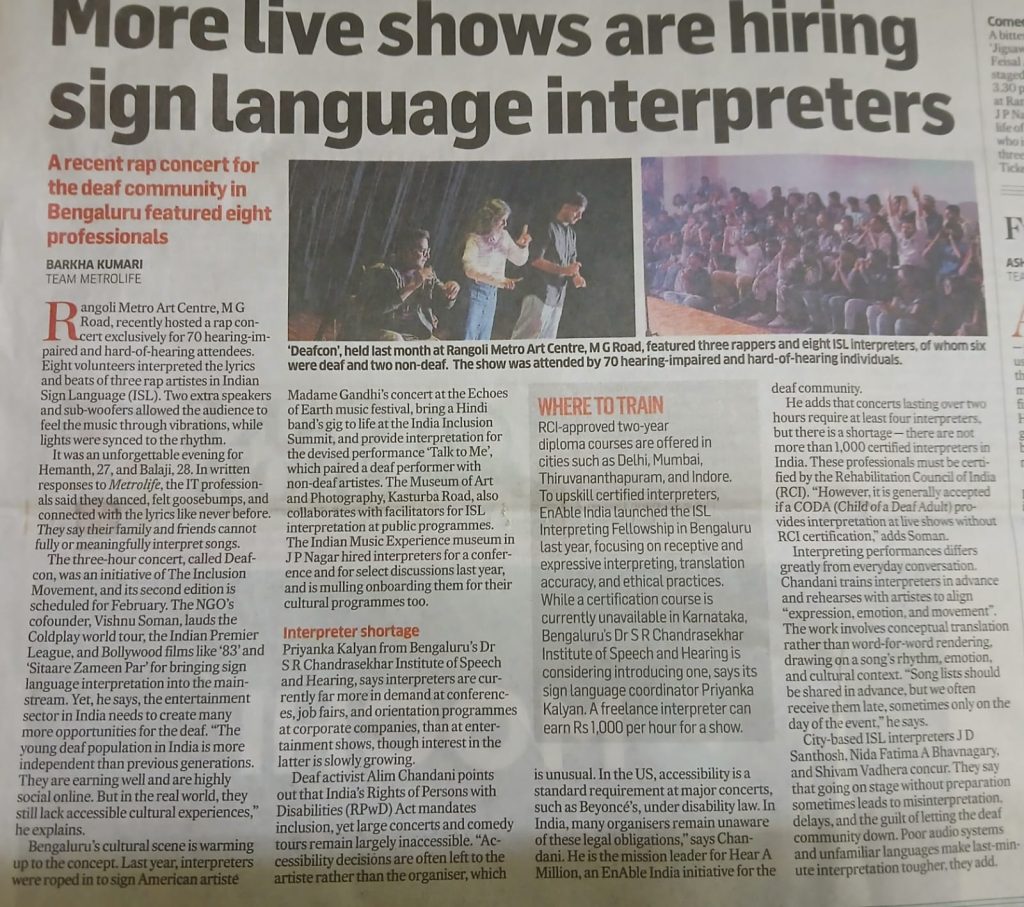
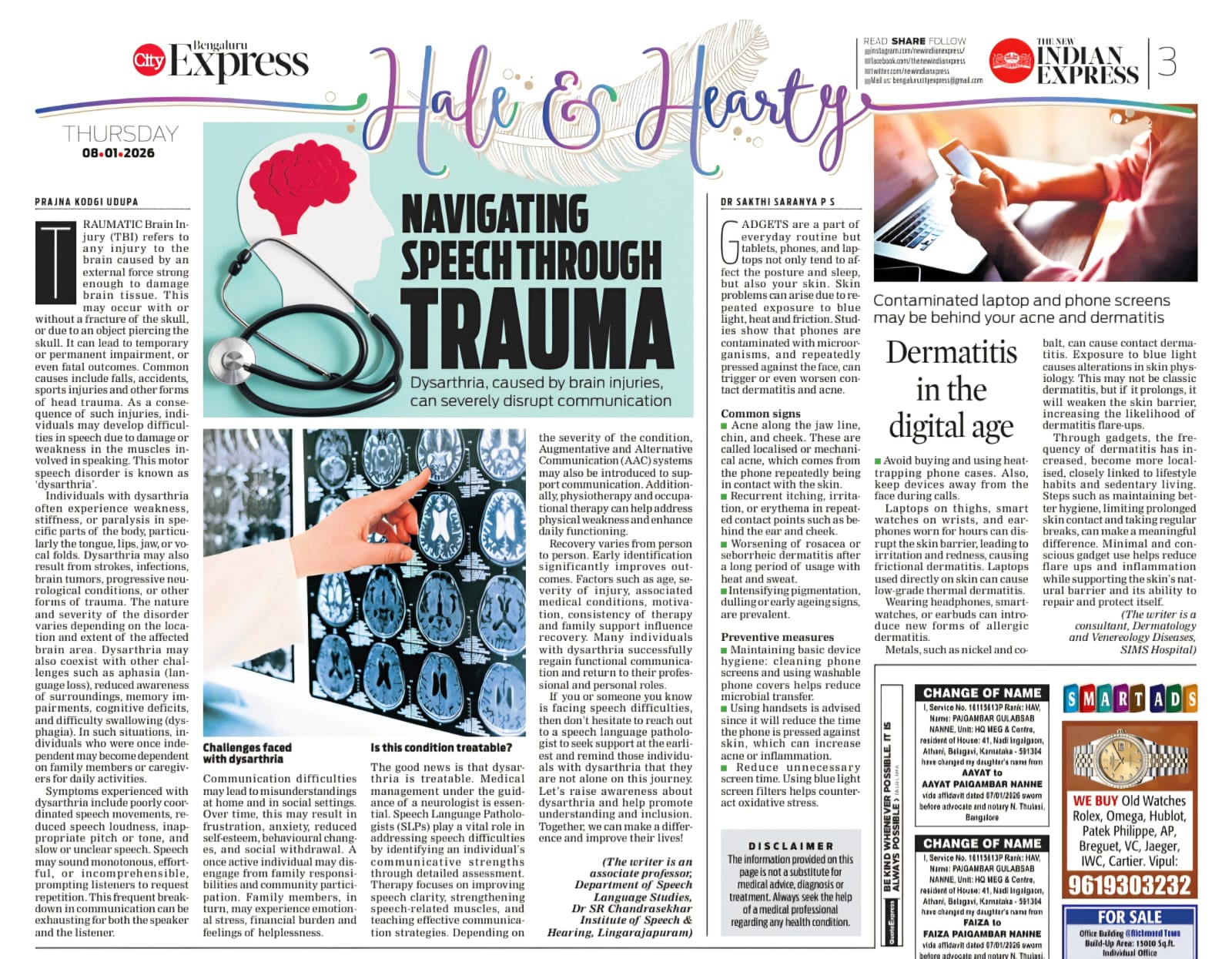
Choose The Best Academic Institute
Dr.S.R. Chandrasekhar Institute of Speech and Hearing College stands as the academic pillar of the Bangalore Speech and Hearing Trust (BSHT).
Our institute offers comprehensive clinical services for Hearing, Language, and Speech disorders and promotes academic excellence. We provide a range of courses
The selected candidates will receive a maintenance allowance and course fee for 10 months in an academic year (INR 10,000 for Hosteller and INR 5,000 for Day Scholar).
The Institute has a well-equipped library with a vast collection of national and international publications, books and journals in the field. There are several computers with internet access available at the Information centre.
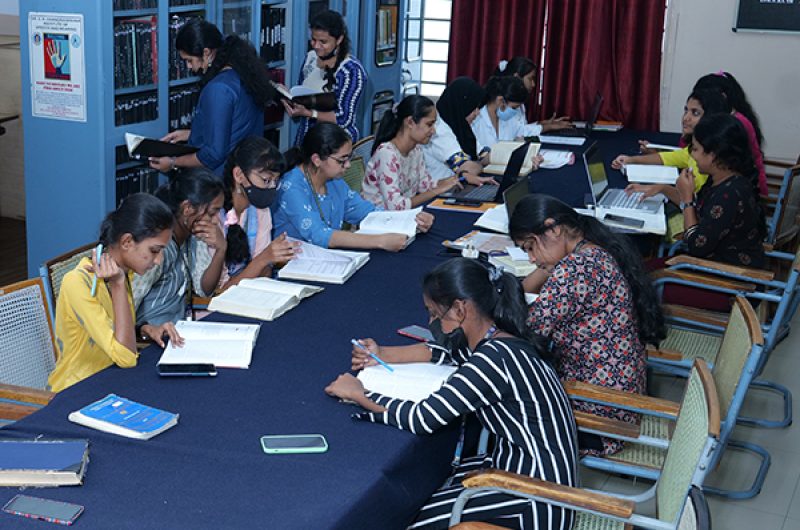
Why Choose Sunaad
School
Sunaad School for the Hearing Impaired, established in 1988, addresses the needs of children with hearing impairment.
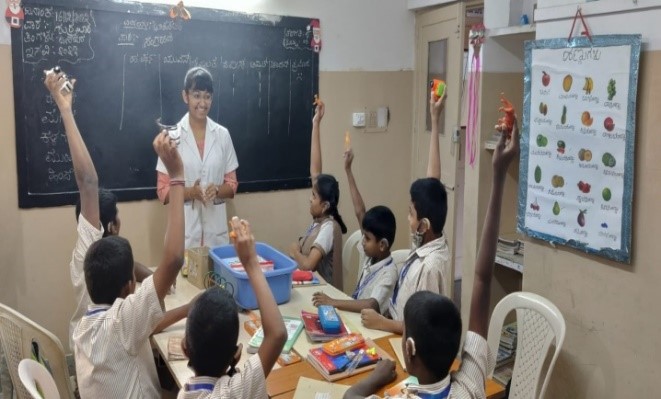
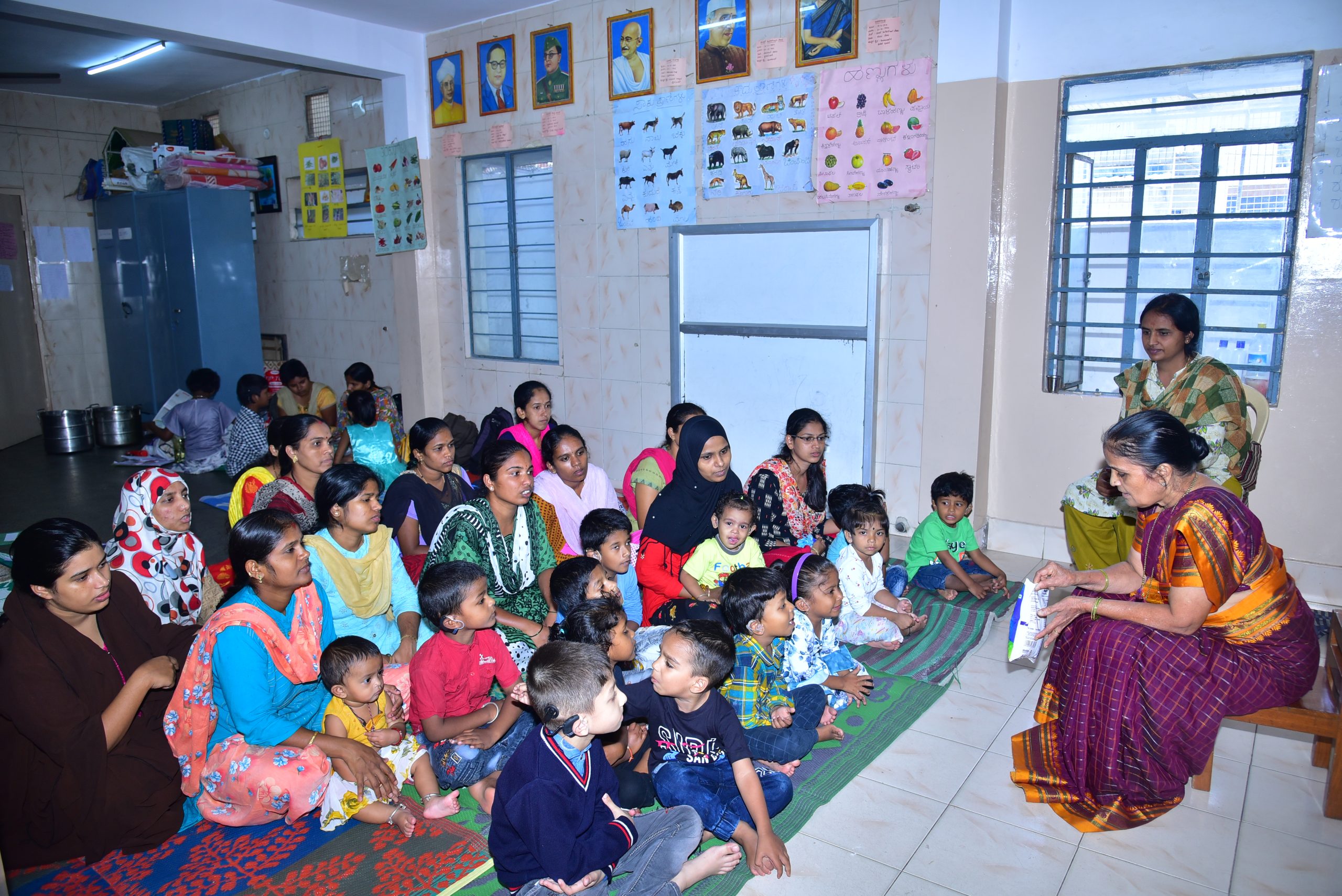
All about our Mothers Training Centre

The program at the Mother’s Training Centre (MTC), adapted from the Little Woodford School program by Wing Commander KK Srinivasan, began on March 1, 2007, with five children.
Comprehensive Audiometry Services: Ensuring Sound Hearing Health for All
We are dedicated to Research Publications.
Collaborations
CSR Funding
MAHE
Auditing
Testimonials






